 28.03.2024, 10:39
28.03.2024, 10:39
|
#101146
|
|
Местный
Регистрация: 04.10.2017
Сообщений: 103,458
Сказал(а) спасибо: 0
Поблагодарили 6 раз(а) в 6 сообщениях
|
 Cma Part 2 Exam Preparation Comprehensive Course Bundle
Cma Part 2 Exam Preparation Comprehensive Course Bundle
Cma Part 2 Exam Preparation: Comprehensive Course Bundle

Published 3/2024
MP4 | Video: h264, 1920x1080 | Audio: AAC, 44.1 KHz
Language: English | Size: 3.64 GB | Duration: 14h 22m
Prepare for the CMA Part 2 exam. Financial management, decision analysis, risk management, and professional ethics.
What you'll learn
In this course, students will learn comprehensive skills and knowledge essential for success in the Certified Management Accountant (CMA) Part 2 exam.
Ethical Standards and Professionalism: Understand the principles and standards of ethical conduct in management accounting and financial management.
Explore moral philosophies and their application in ethical decision-making. Analyze case studies to identify ethical dilemmas and apply ethical frameworks
Financial Statement Analysis: Learn techniques for analyzing financial statements to assess liquidity, profitability, and solvency.
Understand key financial ratios and their interpretation for decision-making purposes. Evaluate the impact of operating and financial leverage
Corporate Finance: Explore the principles of risk and return and their implications for financial decision-making.
Understand capital budgeting techniques, such as net present value (NPV) and internal rate of return (IRR), for investment analysis.
Learn about various sources of long-term financing and their implications for capital structure decisions.
Decision Analysis and Risk Management: Master decision-making techniques, including marginal analysis and special order analysis.
Learn how to assess and manage risk exposures in business operations. Understand pricing strategies and their role in revenue optimization and risk mitigation.
Cost-Volume-Profit (CVP) Analysis and Marginal Analysis: Learn how to compute breakeven points and target incomes using CVP analysis.
Understand the relationship between costs, revenues, and profits in short-run decision-making.
Apply marginal analysis techniques to make optimal business decisions in various scenarios.
Investment Decisions: Explore capital budgeting methods, such as payback period and discounted cash flow analysis.
Learn how to evaluate and rank potential investment projects based on their financial viability. Understand the importance of risk assessment and uncertainty
Professional Ethics and Responsibility: Gain insights into ethical standards and responsibilities for management accountants.
Understand the implications of unethical behavior and the importance of corporate governance. Learn how to navigate ethical dilemmas and uphold integrity
Requirements
Foundational Knowledge in Accounting and Finance: Students should possess a strong understanding of basic accounting principles, financial statements (such as balance sheets, income statements, and cash flow statements), and financial analysis techniques. Familiarity with concepts like cost behavior, budgeting, and variance analysis would also be beneficial.
Bachelor's Degree or Equivalent: While not strictly required, most candidates pursuing the CMA designation hold a bachelor's degree in accounting, finance, or a related field. The coursework completed as part of a bachelor's program typically covers foundational concepts relevant to the CMA exam.
Experience in Management Accounting or Financial Management: While there are no specific experience requirements to enroll in the course, candidates aiming for the CMA designation typically have at least two years of professional experience in management accounting or financial management roles. Practical experience in applying accounting and financial principles enhances understanding and retention of course material.
Motivation and Commitment: Success in the CMA Part 2 exam requires dedication and perseverance. Students should be motivated to actively engage with course materials, participate in practice exercises, and seek clarification on concepts as needed. Developing effective study habits and time management skills is essential for maximizing learning outcomes.
Description
Welcome to our comprehensive course on Certified Management Accountant (CMA) Part 2 Exam Preparation! This course is meticulously designed to equip you with the knowledge and skills necessary to excel in the CMA Part 2 examination, covering a wide array of topics essential for management accountants.In this course, we will delve into the latest updates relevant to the CMA Part 2 syllabus, ensuring that you are well-prepared for the exam. From ethics and moral philosophy to financial statement analysis, corporate finance, decision analysis, risk management, and professional ethics, each section is crafted to provide you with a deep understanding of core concepts and practical applications.You will explore the intricacies of financial statement analysis, learning to interpret financial data to make informed business decisions. Through detailed discussions on liquidity ratios, capital structure, leverage, and ratio analysis limitations, you will gain valuable insights into assessing a company's financial health.Additionally, our course will guide you through the principles of corporate finance, covering risk and return, bond valuation, stock valuation, cost of capital, cash management, and short-term financing strategies. You will also delve into decision analysis techniques, cost-volume-profit analysis, investment decisions, and professional ethics tailored to management accountants.Throughout the course, you will have access to comprehensive study materials, including lectures, case studies, and practice questions, to reinforce your learning and prepare you for success in the CMA Part 2 examination. Whether you are aspiring to become a certified management accountant or seeking to enhance your knowledge in managerial accounting, this course will provide you with the necessary tools to achieve your goals.Join us on this journey as we delve into the intricate world of management accounting, empowering you to become a proficient and ethical finance professional ready to tackle the challenges of today's dynamic business environment. Let's embark on this learning adventure together! Section wise, we will learn as follows:Section 1: CMA Part 2 - Latest Updates This section serves as an introduction to the course, providing students with an overview of what to expect. It begins by establishing the importance of ethical considerations in management accounting, exploring various ethical theories and principles. Case studies are utilized to illustrate real-world ethical dilemmas, and students learn about the frameworks and standards guiding ethical conduct in organizations.Section 2: Financial Statement Analysis Here, students delve into the analysis of financial statements, which is crucial for understanding a company's financial health and performance. They learn about different ratios used to assess liquidity, efficiency, profitability, and solvency. Additionally, concepts like the DuPont model help students understand the drivers behind return on assets (ROA) and return on equity (ROE).Section 3: Corporate Finance This section focuses on the financial decisions corporations make to maximize shareholder value. Students learn about risk and return relationships, capital budgeting techniques, cost of capital estimation, and working capital management strategies. They also explore various sources of long-term financing and the importance of cash flow forecasting in financial decision-making.Section 4: Decision Analysis | Risk Management Decision analysis involves evaluating alternatives and making informed choices based on quantitative and qualitative factors. Students learn about techniques such as marginal analysis, pricing strategies, and risk management to make effective decisions in uncertain environments. The section emphasizes understanding demand elasticity, pricing strategies, and managing risk exposures.Section 5: Cost-Volume and Profit (CVP) | Marginal Analysis Cost-volume-profit (CVP) analysis helps businesses understand the relationship between costs, volume, and profits. Students explore concepts such as breakeven analysis, contribution margin, and target income calculation. They also learn how to use marginal analysis to make decisions regarding product mix, special orders, and profit maximization.Section 6: Investment Decisions This section focuses on evaluating investment opportunities to allocate resources efficiently. Students learn about capital budgeting methods like net present value (NPV), internal rate of return (IRR), and payback period analysis. They also explore techniques for ranking investment projects and assessing their impact on the company's value.Section 7: Professional Ethics Ethical conduct is fundamental in the field of management accounting. In this section, students learn about ethical principles, standards, and codes of conduct governing the profession. They explore case studies, ethical decision-making frameworks, and legal considerations such as the Foreign Corrupt Practices Act and the Sarbanes-Oxley Act.Section 8: Professional Ethics and Additional Readings This final section provides a deeper dive into professional ethics and offers additional resources for further exploration. Students review key terms, delve into cost behavior analysis, and examine pricing strategies in more detail. They also learn about the importance of sustainability, social responsibility, and the interplay between supply and demand in a dynamic business environment.By covering these diverse topics, students gain a holistic understanding of management accounting principles, ethical considerations, and financial decision-making processes, preparing them for success in the CMA Part 2 exam and their careers in the field.ALL INFORMATION on CMA Part 2 ExamThe Certified Management Accountant (CMA) Part 2 exam, administered by the Institute of Management Accountants (IMA), is a comprehensive evaluation of candidates' proficiency in advanced management accounting and financial management topics. Here's a detailed overview of the exam:Exam Structure:The CMA Part 2 exam consists of two sections: Financial Decision Making and Advanced Financial Management.Each section comprises 100 multiple-choice questions and two essay scenarios, with a total of 4 hours allocated for completion.Financial Decision Making:This section focuses on financial statement analysis, corporate finance, decision analysis, and risk management.Candidates are assessed on topics such as financial statement analysis techniques, risk assessment methods, investment decisions, and ethical considerations in financial management.Advanced Financial Management:This section covers financial management techniques, including cost management, internal controls, and professional ethics.Candidates are tested on subjects such as cost-volume-profit analysis, budgeting, performance evaluation, and ethical standards for management accountants.Preparation Resources:Candidates can access study materials provided by the IMA, including textbooks, practice questions, and online resources.Review courses and study guides offered by various educational providers can also help candidates prepare effectively for the exam.Exam Format:The exam is computer-based and consists of multiple-choice questions and essay scenarios.Candidates must demonstrate proficiency in both types of questions to pass the exam.Passing Score:The passing score for the CMA Part 2 exam is determined by the IMA and is not disclosed to candidates.Candidates must achieve a scaled score that meets or exceeds the passing threshold to earn the CMA designation.Certification:Upon passing both Part 1 and Part 2 of the CMA exam and fulfilling the education and experience requirements, candidates will earn the Certified Management Accountant (CMA) designation.The CMA designation demonstrates expertise in financial management, strategic planning, and decision-making skills, enhancing career opportunities in management accounting and finance.Exam Eligibility:Candidates must meet specific education and experience requirements to be eligible to sit for the CMA exam.Eligibility criteria include holding a bachelor's degree from an accredited institution and completing at least two years of professional experience in management accounting or financial management.Exam Administration:The CMA exam is administered at Prometric test centers worldwide.Candidates can schedule their exam appointments through the IMA website and select a convenient test center location and date.Continuing Education:CMA designation holders are required to maintain their certification by fulfilling continuing education requirements, which include completing a certain number of continuing professional education (CPE) credits annually.Overall, the CMA Part 2 exam is a rigorous assessment of candidates' knowledge and skills in advanced management accounting and financial management, essential for professionals seeking to advance their careers in management accounting and finance.Exam Content:The CMA Part 2 exam covers a wide range of topics essential for management accountants and financial professionals.Candidates are expected to have a thorough understanding of financial analysis, decision-making techniques, risk management, corporate finance principles, and ethical considerations in business.Study Approach:Candidates are encouraged to adopt a comprehensive study approach, combining self-study with review courses and practice exams.Utilizing study materials provided by the IMA and reputable educational providers can help candidates prepare effectively for the exam.Time Management:Managing time effectively during the exam is crucial for success. Candidates should allocate sufficient time to answer each question and review their responses.Practicing time management techniques during mock exams can help candidates improve their efficiency on the actual exam day.Essay Writing Skills:The essay scenarios in the exam require candidates to analyze complex business situations and provide well-structured responses.Candidates should practice writing concise and coherent essays, focusing on addressing all aspects of the scenario and demonstrating their analytical skills.Ethics and Professionalism:Ethical considerations are integral to the CMA exam, reflecting the importance of ethical behavior in the field of management accounting.Candidates should familiarize themselves with ethical standards and guidelines outlined by the IMA and demonstrate ethical decision-making skills in their exam responses.Continuous Learning:The field of management accounting and financial management is constantly evolving, requiring professionals to engage in continuous learning and professional development.CMA designation holders are encouraged to stay updated on industry trends, regulations, and best practices through participation in seminars, webinars, and professional networking opportunities.By adopting a systematic study approach, practicing effective time management, honing essay writing skills, emphasizing ethics and professionalism, and committing to continuous learning, candidates can increase their chances of success in the CMA Part 2 exam and advance their careers in management accounting and finance.Exam Difficulty:The CMA Part 2 exam is considered challenging due to its comprehensive coverage of advanced topics in management accounting and financial management.Candidates are required to demonstrate a deep understanding of theoretical concepts as well as practical applications in various business scenarios.Practice Questions:Practicing a diverse range of sample questions and past exam papers is essential for familiarizing oneself with the exam format and types of questions asked.Reviewing practice questions helps candidates identify areas of strength and weakness, allowing them to focus their study efforts accordingly.Professional Experience Requirement:In addition to passing the exam, candidates must fulfill a minimum of two years of relevant professional experience in management accounting or financial management to earn the CMA designation.The professional experience requirement ensures that CMA designation holders possess practical skills and knowledge applicable to real-world business environments.Exam Retake Policy:Candidates who do not pass the exam on their first attempt have the option to retake it during subsequent testing windows.The IMA allows candidates to retake individual exam sections rather than the entire exam, providing flexibility for focused review and improvement.Exam Preparation Timeline:Candidates should allocate an adequate amount of time for exam preparation, taking into account their existing knowledge, study habits, and personal commitments.A recommended study timeline typically ranges from three to six months, allowing sufficient time for thorough review of exam content and practice.Exam Registration and Fees:Candidates must register for the exam through the IMA website and pay the applicable exam fees.The exam fees cover the cost of exam administration and access to study materials provided by the IMA, including textbooks and online resources.Career Benefits:Earning the CMA designation demonstrates a commitment to professional excellence and enhances career prospects in management accounting, financial analysis, and corporate finance.CMA designation holders are recognized globally for their expertise in financial management and are sought after by employers seeking skilled professionals in the field.Overall, the CMA Part 2 exam serves as a benchmark for evaluating candidates' knowledge, skills, and competency in advanced management accounting and financial management, paving the way for rewarding career opportunities in the field.
Overview
Section 1: CMA Part 2 - Latest Updates
Lecture 1 Introduction to Course
Lecture 2 Ethics
Lecture 3 Moral Philosophy
Lecture 4 Case Study
Lecture 5 Principals and Standards
Lecture 6 Ethical Decision Making
Lecture 7 Fraud Triangle
Lecture 8 Legal Considerations
Lecture 9 Social Responsibility
Lecture 10 Framework for Ethical Conduct
Lecture 11 Framework for Ethical Conduct Continued
Section 2: Financial Statement Analysis
Lecture 12 Introduction to Financial Statement Analysis
Lecture 13 Liquidity Ratio
Lecture 14 Net Working Capital
Lecture 15 Current and Quick Ratio
Lecture 16 Cash Ratio and Cash Flow Ratio
Lecture 17 Net Working Capital Ratio
Lecture 18 Receivable Turnover Ratio
Lecture 19 Inventory and Payables Turnover Ratio
Lecture 20 Operating and Cash Cycle
Lecture 21 Assets Turnover Ratios
Lecture 22 Capital Structure Ratios
Lecture 23 Earning Coverage Ratio
Lecture 24 Leverage
Lecture 25 Operating Leverage and Financial Leverage
Lecture 26 Equity Multiplier and Return on IM
Lecture 27 DuPont Model of ROA and ROE
Lecture 28 Market Valuations of Shares
Lecture 29 Earning Per Share
Lecture 30 Earning and Dividend Ratios
Lecture 31 Limitations of Ratio Analysis
Lecture 32 Common Size Financial Statements
Lecture 33 Foreign Exchange Gains and Losses
Lecture 34 Remeasurement and Translation
Section 3: Corporate Finance
Lecture 35 Introduction to Corporate Finance
Lecture 36 Risk and Return and Financial Instruments
Lecture 37 Standard Deviation
Lecture 38 Capital Asset Pricing Model (CAPM)
Lecture 39 Portfolio Management
Lecture 40 Bond Overview
Lecture 41 Types of Bonds
Lecture 42 Bond Valuation
Lecture 43 Overview of Common Stock
Lecture 44 Preferred Stock
Lecture 45 Stock Valuation Overview
Lecture 46 Preferred Stock Valuation
Lecture 47 Dividend Growth Model
Lecture 48 Variable Dividend Growth
Lecture 49 Derivatives Hedging and Options
Lecture 50 Forward Contracts
Lecture 51 Other Sources of Long Term Financing
Lecture 52 Introduction to Cost of Capital
Lecture 53 Weighted Average Cost of Capital
Lecture 54 Weighted Average Cost of Capital Continues
Lecture 55 Marginal Cost of Capital
Lecture 56 Cost of New Capital
Lecture 57 Working Capital Policy
Lecture 58 Cash Management
Lecture 59 Forecasting Future Cash Flows
Lecture 60 Cash Collection
Lecture 61 Speeding up Cash Collections
Lecture 62 Receivables Management
Lecture 63 Inventory Management
Lecture 64 Short Term Financing
Lecture 65 Cost of not Taking Discount
Lecture 66 Effective Interest Rate on Loan
Lecture 67 Factoring of Accounts Receivable
Lecture 68 Dividend Policies and Share Repurchase
Section 4: Decision Analysis | Risk Management
Lecture 69 Introduction to Decision Analysis and Risk Management
Lecture 70 Decision Making By Marginal Analysis
Lecture 71 Accepting Special Orders
Lecture 72 Making or Buying the Product
Lecture 73 Decision Making Other Situations
Lecture 74 Price Elasticity of Demand
Lecture 75 Demand Elasticity Co-Efficient
Lecture 76 Pricing Strategies
Lecture 77 Pricing Strategies Continues
Lecture 78 Risk Management
Lecture 79 Strategies for Risk Exposures
Section 5: Cost-Volume and Profit (CVP) | Marginal Analysis
Lecture 80 Introduction to CVP and Breakeven Point Analysis
Lecture 81 Margin of Safety and Target Incomes
Lecture 82 Mathematical Method of Computing Target Income
Lecture 83 Choosing a Product
Lecture 84 Special Order
Lecture 85 Marginal Revenue and Cost
Lecture 86 Profit Maximization
Lecture 87 Short Run Cost Relationship
Section 6: Investment Decisions
Lecture 88 Introduction to Investment Decision
Lecture 89 Overview of Capital Budgeting
Lecture 90 Ranking a Potential Investment
Lecture 91 Discounted Cash Flow Analysis
Lecture 92 NPV and IRR Method
Lecture 93 Payback Method
Lecture 94 Discounted Payback Method
Lecture 95 Ranking Investment Projects
Section 7: Professional Ethics
Lecture 96 Introduction to Professional Ethics
Lecture 97 Principles for Ethical Professional Practice
Lecture 98 Standards for Ethical Professional Practice
Lecture 99 Standard of Confidentiality
Lecture 100 Standard of Integrity and Confidentiality
Lecture 101 Resolution for Ethical Conflict
Lecture 102 Foreign Corrupt Practice act 1977
Lecture 103 Sarbanes Oxley Act 2002 (SOX)
Lecture 104 Corporate Responsibility for Ethical Behavior
Lecture 105 More on Corporate Responsibility
Lecture 106 Ethics for Management Accountant
Lecture 107 Fraud and Fraud Risk Model
Lecture 108 Fraud and Fraud Risk Model Continues
Lecture 109 Addressing Fraud and Error
Section 8: Professional Ethics and Additional Readings
Lecture 110 Key Terms
Lecture 111 Moral Philosophies
Lecture 112 Principals and Standards
Lecture 113 Resolving Ethical Conflicts
Lecture 114 Fraud Triangle
Lecture 115 Case Studies
Lecture 116 Ethical Considerations for Organizations
Lecture 117 Ethical Considerations for Organizations Continune
Lecture 118 Framework for Ethical Conduct
Lecture 119 Sustainability and Social Responsibility
Lecture 120 Terminology
Lecture 121 Cost Behavior
Lecture 122 Breakeven Calculation
Lecture 123 Special Order Analysis
Lecture 124 Make or Buy Analysis
Lecture 125 Sell or Process Analysis
Lecture 126 Keep or Sell Analysis
Lecture 127 Keep or Sell Analysis Continue
Lecture 128 Maximizing Margin Analysis
Lecture 129 Pricing
Lecture 130 Pricing Approaches
Lecture 131 Pricing Approaches Continue
Lecture 132 Demand and Supply
Lecture 133 Price Elastisity
Aspiring Management Accountants: Individuals who aspire to pursue a career in management accounting and seek to enhance their knowledge and skills in advanced management accounting and financial management topics to prepare for the CMA Part 2 exam.,Finance Professionals: Professionals already working in finance-related roles, such as financial analysts, cost accountants, budget analysts, or financial managers, who aim to attain the prestigious CMA designation to advance their careers and increase their marketability.,Recent Graduates: Recent graduates with a degree in accounting, finance, or a related field who are keen on obtaining professional certifications to differentiate themselves in the job market and accelerate their career progression.,Accounting and Finance Students: Undergraduate or graduate students currently enrolled in accounting or finance programs who wish to supplement their academic studies with practical, industry-relevant knowledge and prepare for future career opportunities in management accounting and financial management.,Professionals Seeking Career Transition: Individuals from diverse professional backgrounds looking to transition into management accounting or financial management roles and seeking to acquire the necessary knowledge and credentials to facilitate this transition.,Corporate Training Programs: Organizations and corporate entities interested in providing comprehensive training and professional development opportunities for their finance and accounting teams, with a focus on preparing them for the CMA Part 2 exam and enhancing their overall competency in financial management.
Screenshots
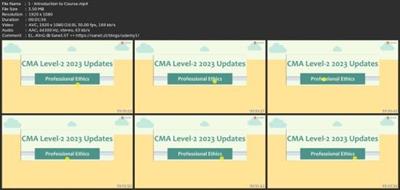
rapidgator.net:
Код:
https://rapidgator.net/file/cfe14c8c9e892117f0f0cff3a8ebb3dc/uphhl.Cma.Part.2.Exam.Preparation.Comprehensive.Course.Bundle.part1.rar.html
https://rapidgator.net/file/b9b6b4750a0335e95d269eebf7f2bd66/uphhl.Cma.Part.2.Exam.Preparation.Comprehensive.Course.Bundle.part2.rar.html
https://rapidgator.net/file/343fd3158ae1814b0913d2128186b225/uphhl.Cma.Part.2.Exam.Preparation.Comprehensive.Course.Bundle.part3.rar.html
https://rapidgator.net/file/aa8b29b1e8c17496b891313303ae9539/uphhl.Cma.Part.2.Exam.Preparation.Comprehensive.Course.Bundle.part4.rar.html
nitroflare.com:
Код:
https://nitroflare.com/view/4BCCE3021012BB3/uphhl.Cma.Part.2.Exam.Preparation.Comprehensive.Course.Bundle.part1.rar
https://nitroflare.com/view/193022F563FD559/uphhl.Cma.Part.2.Exam.Preparation.Comprehensive.Course.Bundle.part2.rar
https://nitroflare.com/view/6EB63B879AF14C2/uphhl.Cma.Part.2.Exam.Preparation.Comprehensive.Course.Bundle.part3.rar
https://nitroflare.com/view/727A42B9F9B7843/uphhl.Cma.Part.2.Exam.Preparation.Comprehensive.Course.Bundle.part4.rar
|

|

|
 28.03.2024, 10:40
28.03.2024, 10:40
|
#101147
|
|
Местный
Регистрация: 04.10.2017
Сообщений: 103,458
Сказал(а) спасибо: 0
Поблагодарили 6 раз(а) в 6 сообщениях
|
 Complete Itil 4 Foundation Certification Course & Practices
Complete Itil 4 Foundation Certification Course & Practices
Complete Itil 4 Foundation Certification Course & Practices

Published 3/2024
MP4 | Video: h264, 1920x1080 | Audio: AAC, 44.1 KHz
Language: English | Size: 971.57 MB | Duration: 4h 4m
Understand the value of ITSM in the organization and prepare the ITSM Foundation certification in a weekend
What you'll learn
IT Service Management
key concepts
Guiding principles
4 dimensions
practices
prepare for the certification
Requirements
No prerequisites to take this course
Description
Disclaimer: This UNOFFICIAL course is not affiliated with or endorsed by Axelos.Not Affiliated with or Endorsed by AXELOSNon-affiliation disclaimer: This UNOFFICIAL course is not associated with or endorsed by Axelos.Unlock the Secrets of IT Service Management with ITSM Foundation CertificationIn today's fast-paced and ever-evolving digital landscape, efficient IT service delivery is crucial for organizations of all sizes and industries to succeed. ITSM Foundation, the latest version of the world's leading IT service management framework, provides a comprehensive set of best practices for organizations to manage their IT services effectively and deliver value to their customers.Enhance Your IT Expertise and Advance Your CareerThis comprehensive 4-hour course will equip you with the knowledge and skills you need to:- Understand the core concepts of IT service management- Grasp the ITSM Foundation framework, including the Four Dimensions, Guiding Principles, Service Value System, and IT Service Management Best Practices- Create value for customers through IT services- Manage service offerings and relationships effectively- Achieve desired outcomes and mitigate risks- Measure the utility and warranty of IT servicesThis course is designed for:IT professionals who want to gain a foundational understanding of ITSM and its role in IT service managementIndividuals seeking to embark on their ITSM certification journeyProfessionals looking to enhance their IT knowledge and skillsAnyone who wants to contribute to the implementation of ITSM practices in their organizationUpon successful completion of this course, you will:- Earn the ITSM Foundation certification, a globally recognized credential that demonstrates your proficiency in IT service management- Enhance your understanding of the latest ITSM framework and its impact on IT operations- Gain the skills to effectively manage IT services and deliver value to customers- Strengthen your career prospects and open up new opportunities in the IT industry- Practice exams to prepare for the exam day
Overview
Section 1: Introduction
Lecture 1 Introduction
Lecture 2 5 reasons to get certified
Lecture 3 Course Mastery: Your Guide to Learning Success
Lecture 4 Get The Training Slides
Lecture 5 The ITIL 4 Foundation Exam
Lecture 6 Why A New ITIL
Section 2: Service Management : Key Concepts
Lecture 7 Introduction
Lecture 8 Learning Objectives
Lecture 9 The need for Service Management
Lecture 10 Understanding Value
Lecture 11 Value Co-Creation
Lecture 12 Value Co-Creation forms
Lecture 13 Example : Value Co-Creation
Lecture 14 Example : Value And Stakeholders
Lecture 15 Service, Costs and Risks
Lecture 16 Outputs facilitate Outcomes
Lecture 17 Utility And Warranty
Lecture 18 Example : Risks and Costs
Lecture 19 Service Relationships
Lecture 20 Example : Service Consumption and Provision
Lecture 21 Services And Products
Lecture 22 Example : Services And Products
Lecture 23 Outputs vs Outcomes and Watermelon Effect
Lecture 24 Service Offering
Lecture 25 Summary
Section 3: The 4 Dimensions Of IT Service Management
Lecture 27 Introduction
Lecture 28 Organization And People
Lecture 29 Information And Technology
Lecture 30 Cloud Computing
Lecture 31 Partners And Suppliers
Lecture 32 Value Streams And Processes
Lecture 33 External Factors
Lecture 34 Example : External Factors
Lecture 35 Example : 4 Dimensions
Lecture 36 Summary
Section 4: The ITIL Service Value System
Lecture 38 Learning Objectives
Lecture 39 The Service Value System
Lecture 40 Inputs and Outcomes of the SVS
Lecture 41 The 7 Guiding Principles
Lecture 49 Governance
Lecture 50 Service Value Chain
Lecture 53 Practices
Lecture 54 Continual Improvement
Lecture 55 Example : Service Value System
Section 5: The ITIL Practices
Lecture 57 Introduction and Learning Objectives
Lecture 58 What Is A Practice ?
Lecture 59 General Management Practices
Lecture 60 Continual Improvement
Lecture 61 Information Security Management
Lecture 62 Relationship Management
Lecture 63 Supplier Management
Lecture 64 Service Management Practices
Lecture 65 Availability Management
Lecture 66 Capacity And Performance Management
Lecture 67 Change Enablement
Lecture 68 The Evolution Of Change
Lecture 70 Incident Management
Lecture 71 Example :Incident Management
Lecture 72 IT Asset Management
Lecture 73 Monitoring And Event Management
Lecture 75 Problem Management
Lecture 76 Example :Problem Management
Lecture 77 Incident Vs Problem
Lecture 78 Release Management
Lecture 79 Service Configuration Management
Lecture 80 IT Asset Vs CI
Lecture 81 Service Continuity Management
Lecture 82 Service Desk
Lecture 83 Example :Service Desk
Lecture 84 Service Level Management
Lecture 85 SLA :Service Level Agreement
Lecture 86 Service Request Management
Lecture 88 Technical Management Practices
Lecture 89 Deployment Management
Lecture 90 Deployment Vs Release
Lecture 91 Summary
Anyone who needs to start a career in IT,Anyone looking to get certified,IT students,IT professionals,IT manager
Screenshots
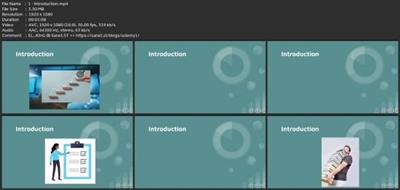
rapidgator.net:
Код:
https://rapidgator.net/file/c364c9742b448a372d5d1b43247aca8a/yrmfy.Complete.Itil.4.Foundation.Certification.Course..Practices.rar.html
nitroflare.com:
Код:
https://nitroflare.com/view/704D4E52829D985/yrmfy.Complete.Itil.4.Foundation.Certification.Course..Practices.rar
|

|

|
 28.03.2024, 10:41
28.03.2024, 10:41
|
#101148
|
|
Местный
Регистрация: 04.10.2017
Сообщений: 103,458
Сказал(а) спасибо: 0
Поблагодарили 6 раз(а) в 6 сообщениях
|
 Construction Estimating HardscapeLandscape Knowledge
Construction Estimating HardscapeLandscape Knowledge
Construction Estimating Hardscape/Landscape Knowledge

Published 3/2024
MP4 | Video: h264, 1920x1080 | Audio: AAC, 44.1 KHz
Language: English | Size: 5.52 GB | Duration: 3h 43m
Knowing How to Measure, Cost/Estimate, Manage, Produce and Successfully Profit as a Hardscape/Landscape Professional.
What you'll learn
Define the roles and responsibilities of project stakeholders!
Learn your businesses profit line for success.
Learn "Field Standards" construction practices for estimating/quoting.
Download and own our statistic standards Suite/Dashboard and Learn to Estimate projects knowing your labor cost and time, materials cost, proposal and profit.
Creating project contracts/proposals for clients, helping to guarantee payments, written legals and profit for you and your company.
Learn job tracking, project monitoring and project control, guaranteeing a positive final profit.
Complete a case study, estimating/quoting a project in its entirety.
Requirements
Basic knowledge of an industry trade is helpful.
Basic math and writing skills.
Basic Hardscape practice and materials knowledge is helpful.
No program experience needed; you will learn everything you'll need to know.
Description
Whether you're contemplating a career in Hardscape/Landscaping or Renovations or you already have a business in motion, the most difficult part of this career/business is maintaining sustainability. It starts with knowledge and knowing your numbers and bottom line! This course has been structured to fundamentally teach, and for some of you, review standard construction materials and labor fundamental knowledge and application to be able to manage or operate a successful, wealthy and healthy company and carrier. This course will teach the necessary skills in every aspect of your projects in order to be successful from start to finish and beyond. Most importantly, you're going to learn how to properly estimate and code a project in minutes, using our own custom made, Pro-Fit Estimator Dashboard.This course is also great for an existing business to get staff and crew re-familiarized with terms and tasks, prior to your seasonal start-up and throughout as a training tool.With over 20 years of experience as an owner of a Hardscape and Renovation construction company myself, I've applied my skills and knowledge into a course to teach "project estimating/quoting" in order to allow more peers on the playing field, a greater advantage for financial success. Financial Success is achieved by creating a profit. The definition of profit is not determined by how much money might be left over once a project is completed, profit is determined prior to taking on a project that you have coded, sold and finished. Profit is to be determined by a number of variables. These variables can only be realized by taking professional steps to determine your business overhead budget, your project time and costs of labor, cost of materials, all combined to enable and create a proper, suggested proposal. The question to really ask is, "What Must Be" my suggested proposal amount"? or (what should I be charging?)At the end of this course, you will be empowered with the knowledge of construction terms and a high standard of materials and labor fundamentals, along with a knowledgeable and professional standard on superior estimating and a means on mastering a profit, making for a healthy and successful business or career.Course Outline* Project stakeholders and their roles and responsibilities.* Learn your business profit line for success by learning your businesses budget. * Learn the "How To" industry standard practical construction and design knowledge. From onsite measuring and design to knowledge of materials and application for creating a proposal and code.* Learn to Estimate/Quote labor, materials and mark-ups to determine a profit, using our customized and preset formulas, estimating program.* Download, learn and use our "Pro-Fit Estimator" Excel Estimating program suite/dashboard, completely yours and completely free, when joining this course, fitted to calculate Estimates, Job Tracking, Contract Creating with payment structures, Budget Template, Project Add-Ons and more to be added in the future.Now let's get down to business!
Overview
Section 1: Introduction to Hardscape/Landscape
Lecture 1 Introduction Welcome Video. Roles and Responsibilities of Project Stakeholders
Lecture 2 Identifying the term "Stakeholder"
Section 2: Your Profit Budget
Lecture 3 Intro to Your Business Profit Budget
Lecture 4 How to perform a business budget on our Pro-Fit Estimator Template
Section 3: Hardscape Construction Knowledge
Lecture 5 Intro to Hardscape Construction Knowledge
Lecture 6 Managing A Project
Lecture 7 Landscape Materials, Terminology and Uses
Lecture 8 Volume Calculations/Formulas/Construction Theory
Lecture 9 Calculating Material Quantities
Lecture 10 Measuring steps and slope grade
Section 4: Inputting The Dashboard
Lecture 11 Intro to the Pro-Fit Estimator
Lecture 12 Learning The Pro-Fit Estimator
Lecture 13 Final Reminders
Lecture 14 Job Tracking
Lecture 15 On a Final Note, adding cells to your tracker
Lecture 16 Creating Contracts and Proposals
Section 5: Final Review, Tips and Case Study
Lecture 17 Final Review, Tips and Case Study
This program is aimed at novice learners and existing business owners in the or wanting to be in the hardscape/landscape industry.,This is also a great refresher tool for existing companies to share with staff and crew to prepare for the season or for newly hired members to get them on board knowledgably.
Screenshots
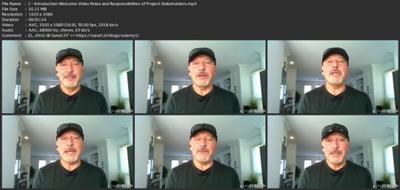
rapidgator.net:
Код:
https://rapidgator.net/file/81576976b836d4536659459d0447856f/fldow.Construction.Estimating.HardscapeLandscape.Knowledge.part1.rar.html
https://rapidgator.net/file/a70148605daae063f447299e3801e421/fldow.Construction.Estimating.HardscapeLandscape.Knowledge.part2.rar.html
https://rapidgator.net/file/a1b1d42e3574a658ef99cef5cb4f23bb/fldow.Construction.Estimating.HardscapeLandscape.Knowledge.part3.rar.html
https://rapidgator.net/file/2be56a93719e01a2f72f8a207c0c1f48/fldow.Construction.Estimating.HardscapeLandscape.Knowledge.part4.rar.html
https://rapidgator.net/file/cb3d0a99ef246bcb04a3fbe53347be87/fldow.Construction.Estimating.HardscapeLandscape.Knowledge.part5.rar.html
https://rapidgator.net/file/729fe1dd4a46c22ac252bf36772f6465/fldow.Construction.Estimating.HardscapeLandscape.Knowledge.part6.rar.html
nitroflare.com:
Код:
https://nitroflare.com/view/EECD18454474834/fldow.Construction.Estimating.HardscapeLandscape.Knowledge.part1.rar
https://nitroflare.com/view/D7A06BFDF05B9E4/fldow.Construction.Estimating.HardscapeLandscape.Knowledge.part2.rar
https://nitroflare.com/view/49E439DD4E698C0/fldow.Construction.Estimating.HardscapeLandscape.Knowledge.part3.rar
https://nitroflare.com/view/1D239933430E472/fldow.Construction.Estimating.HardscapeLandscape.Knowledge.part4.rar
https://nitroflare.com/view/06EA209EA0597BC/fldow.Construction.Estimating.HardscapeLandscape.Knowledge.part5.rar
https://nitroflare.com/view/FA16FDF02BC274D/fldow.Construction.Estimating.HardscapeLandscape.Knowledge.part6.rar
|

|

|
 28.03.2024, 10:42
28.03.2024, 10:42
|
#101149
|
|
Местный
Регистрация: 04.10.2017
Сообщений: 103,458
Сказал(а) спасибо: 0
Поблагодарили 6 раз(а) в 6 сообщениях
|
 Cultural Awareness In The Workplace
Cultural Awareness In The Workplace
Cultural Awareness In The Workplace

Published 3/2024
MP4 | Video: h264, 1920x1080 | Audio: AAC, 44.1 KHz
Language: English | Size: 210.37 MB | Duration: 0h 52m
Embracing Diversity: Mastering Cultural Awareness in the Modern Workplace
What you'll learn
Understand the fundamentals of cultural awareness. Learn what culture entails, including its influence on perceptions and behaviours in the workplace.
Identify and overcome cultural biases and microaggressions. Recognise biases and understand the origins and effects of microaggressions in the workplace.
Master effective communication across cultural boundaries. Learn skills for overcoming communication barriers in multicultural settings.
Build and lead culturally aware teams. Understand the principles of cultural intelligence (CQ) and learn how to apply them.
Implement cultural awareness and integration strategies in the workplace.
Requirements
No prevous knowledge required.
An openness to learning.
Communication skills.
Have access to a consistent internet connection.
Description
"Embracing Diversity: Mastering Cultural Awareness in the Modern Workplace" is a comprehensive online course designed by Hains Academy, crafted to equip professionals across various sectors with the essential skills and knowledge to navigate the complexities of a multicultural work environment effectively. In today's globalised business landscape, understanding and valuing cultural diversity is not just a virtue but a necessity for fostering innovation, collaboration, and inclusivity.This transformative journey unfolds through a series of carefully curated modules, each addressing key aspects of cultural awareness in professional settings. From the foundational concepts of culture and cultural dimensions to practical strategies for communication, leadership, and integration, the course offers a holistic approach to understanding and leveraging diversity in the workplace.Course Highlights:Foundational understanding of culture: Delve into the multifaceted nature of culture, exploring how values, beliefs, and practices influence workplace dynamics and personal interactions.Overcoming biases and microaggressions: Learn to identify and address unconscious biases and microaggressions, creating a more inclusive and respectful work environment.Effective multicultural communication: Master the art of cross-cultural communication, enhancing your ability to convey and interpret messages accurately and sensitively across cultural boundaries.Inclusive leadership and team building: Acquire the skills to lead and manage diverse teams, fostering a culture of empathy, respect, and collaboration.Practical application and integration: Explore real-world applications of cultural awareness, from recruitment and talent management to the development of diversity initiatives.By the end of this course, you will be equipped with an understanding of cultural diversity and its impact on the workplace, along with the practical skills needed to communicate effectively, lead with inclusivity, and create an environment where diverse talents are recognised, valued, and leveraged for organisational success.
Overview
Section 1: Course introduction
Lecture 1 Course introduction
Section 2: Introduction to cultural awareness
Lecture 2 Introduction to cultural awareness
Lecture 3 1.1 - Definition of culture and cultural awareness
Lecture 4 1.2 - Cultural dimensions and frameworks
Lecture 5 1.3 - The modern globalised world and benefits of a culturally aware workplace
Lecture 6 Section conclusion
Section 3: Cultural perspectives, bias, and micro-aggressions
Lecture 7 Cultural perspectives, bias, and micro-aggressions
Lecture 8 2.1 - Recognising diversity in the workplace
Lecture 9 2.2 - Understanding stereotypes and their origins
Lecture 10 2.3 - Implicit bias
Lecture 11 2.4 - Microaggressions in the workplace
Lecture 12 Section conclusion
Section 4: Effective communication in a multicultural workplace
Lecture 13 3 - Effective communication in a multicultural workplace
Lecture 14 3.1 - Communication challenges in a multicultural workplace
Lecture 15 3.2 - Verbal and non-verbal communication across cultures
Lecture 16 3.3 - The role of active listening and feedback
Lecture 17 3.4 - Addressing language barriers
Lecture 18 Section conclusion
Section 5: Building and leading a culturally aware team
Lecture 19 4 - Building and leading a culturally aware team
Lecture 20 4.1 - Cultural intelligence (CQ)
Lecture 21 4.2 - Cultural sensitivity and empathy in practice
Lecture 22 4.3 - Understanding cultural norms, and business etiquette
Lecture 23 Section conclusion
Section 6: Applying cultural awareness and cultural integration
Lecture 24 Applying cultural awareness and cultural integration
Lecture 25 5.1 - Inclusive leadership, diversity initiatives, and creating an inclusive cul
Lecture 26 5.2 - Cultural awareness in hiring, talent management, and retention
Lecture 27 Section conclusion
Section 7: Consolidating and adapting
Lecture 28 6 - Consolidating and adapting
Lecture 29 6.1 - Adapting to different cultural styles
Lecture 30 6.2 - Commitment to continuous growth and understanding
Lecture 31 Section conclusion
Section 8: Course conclusion
Lecture 32 Course conclusion
Professionals across all levels. Whether you're an entry-level employee, a mid-career professional, or in a senior leadership position, this course offers valuable insights into navigating and fostering a culturally aware workplace.,Team leaders and managers. Individuals in leadership or managerial roles who are responsible for building and guiding teams will gain essential skills in creating inclusive, respectful, and productive work environments.,HR professionals and diversity officers focused on fostering an inclusive workplace.,Global and remote workers looking to improve their communication and collaboration skills.,Students and recent graduates preparing for a multicultural work environment.,Individuals committed to personal growth and understanding cultural diversity.
Screenshots
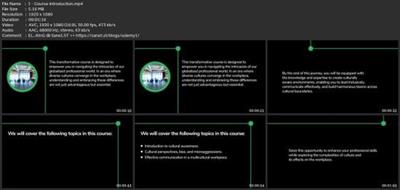
rapidgator.net:
Код:
https://rapidgator.net/file/bdec3720cac59f7f71c2becb1139018f/tsvvc.Cultural.Awareness.In.The.Workplace.rar.html
nitroflare.com:
Код:
https://nitroflare.com/view/692CC589204E623/tsvvc.Cultural.Awareness.In.The.Workplace.rar
|

|

|
 28.03.2024, 10:43
28.03.2024, 10:43
|
#101150
|
|
Местный
Регистрация: 04.10.2017
Сообщений: 103,458
Сказал(а) спасибо: 0
Поблагодарили 6 раз(а) в 6 сообщениях
|
 Design, Edit, Code Fast Boost Productivity Using Lua Macros
Design, Edit, Code Fast Boost Productivity Using Lua Macros
Design, Edit, Code Fast: Boost Productivity Using Lua Macros

Published 3/2024
MP4 | Video: h264, 1920x1080 | Audio: AAC, 44.1 KHz
Language: English | Size: 1.68 GB | Duration: 2h 0m
Graphic Designer, Video Editor, Coder, OBS Users, Digital Artist Use Numpad Shortcut Similar to Devices Like STREAM DECK
What you'll learn
Produce simple Lua Macros codes for mapping keyboard for OBS, After Effects, Visual Studio and other creative workflow
Understand the fundamentals of Lua Macros and how they can revolutionize your workflow by integrating it into your professional work seamlessly
Create custom keyboard shortcuts tailored to your specific needs using Lua Macros and an extra keyboard or numpad
Map keyboard with Lua Macros for video editing and creative work, enhancing efficiency in editing tasks and transitions
Explore real-world examples of Lua Macros in action across design, video editing, and coding tasks
Gain hands-on experience writing Lua Macros code to automate repetitive tasks
Utilize Lua Macros templates for generating Lua files effortlessly, even with zero coding knowledge
Discover alternative solutions for enhancing productivity, such as using special mice with macro buttons
Explore recommended devices and accessories to enhance your Lua Macros experience
Requirements
Only PC Users can run Lua Macros software
If you have an extra numpad or keyboard, that will be good. You can still use your main keyboard though.
If you wish to use template, then you need to install Python and some additional tools (Free) and collect the template zip file
Description
Are you ready to boost your productivity? In this all-inclusive tutorial, I'll reveal the secrets to supercharging your work in design, video editing, and coding using Lua Macros. Say goodbye to boring tasks and hello to efficiency as I guide you through creating and using Lua Macros shortcuts, like those on the Stream Deck.Whether you're a digital artist looking for easy design processes, a video editor wanting quicker edits, a 3D artist, animator, office worker, game streamer, OBS user, or a coder trying to make your work easier, this tutorial is for you. With Lua Macros, you'll learn to create customized shortcuts perfect for your needs, so you can move quickly through your favorite software.We'll dive into Lua Macros, where I'll show you how to create codes to map keyboards and send shortcuts to different software. Lua Macros can help you speed up design changes, make video transitions smoother, and make your code better. Even if you're not a coding pro, don't worry-just follow along and copy-paste a few lines.Explore the endless possibilities of Lua Macros and its ability to transform mundane tasks into seamless processes that empower your creativity. With Lua Macros, you'll discover newfound freedom in your workflow, allowing you to focus on what truly matters-bringing your ideas to life with speed and precision.Join me as I guide you through Lua Macros, unlocking its potential to make your work faster and more efficient. See for yourself how Lua Macros can change the way you work, saving you time and effort.Don't settle for slow, boring tasks anymore. Join me and learn how to design, edit videos, and code faster than ever before with Lua Macros. Boost your productivity and unlock your creativity today!This course is ONLY for PC users! But if you are a MAC user and not interested to know about Lua Macros coding and want to know some alternative solutions, then you may get this course.
Overview
Section 1: Introduction
Lecture 1 Introduction
Lecture 2 Basic Concept - Overview
Lecture 3 Ancient Language & The Code
Section 2: Live Demonstration & All Necessary Tools
Lecture 4 Live Demonstration of The Workflow
Lecture 5 Options for Coders & Non-Coders
Lecture 6 Downloading Necessary Software
Lecture 7 Buy Various Types of Numpads
Section 3: Explaining the Use of Software & Codes
Lecture 8 Explaining the Software
Lecture 9 Finding Out Device Name Manually
Lecture 10 Explaining Codes Line By Line
Section 4: Easy Template Method For Non-Coding People
Lecture 11 Easy Template Method - Download Necessary Software
Lecture 12 How to Use the Template Step By Step
Section 5: Realtime Example - How to Use Lua Macros for Adobe After Effects and OBS
Lecture 13 How to Make Macros for After Effects
Lecture 14 How to Make Macros for OBS
Section 6: Alternative Solution To Macros & Conclusion
Lecture 15 Alternative To Macros
Lecture 16 Submit Your Projects & Outro
Section 7: BONUS SECTION
Lecture 17 Bonus Lecture
Graphic Designers, Video Editors, Coders, Digital Artists, who are looking to streamline their workflow and speed up design iterations using Lua Macros will benefit greatly from this course,Coders and Office Administration: Programmers and developers aiming to increase coding speed, automate repetitive tasks, and improve productivity using Lua Macros will benefit from this course,Beginners with No Coding Knowledge: Individuals with zero coding experience who are eager to learn how to use Lua Macros to boost productivity without any prior coding knowledge will find this course accessible and beginner-friendly,Professionals Seeking Efficiency: Professionals across various industries seeking to enhance their efficiency, save time, and streamline their workflow using Lua Macros will benefit from this course,Those Interested in Automation: Individuals interested in automating repetitive tasks and increasing efficiency in their daily work routines will find the automation capabilities of Lua Macros covered in this course useful,Anyone Seeking to Speed Up Workflow: Anyone looking for an alternative solution of similar expensive devices like Stream Deck, anyone looking to speed up their workflow, regardless of their specific field or expertise, can benefit from learning how to use Lua Macros to create custom keyboard shortcuts tailored to their needs
Screenshots
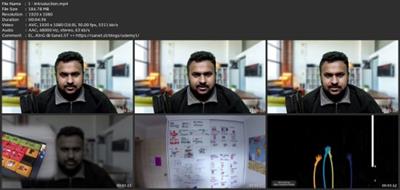
rapidgator.net:
Код:
https://rapidgator.net/file/0dfca819fff97c9683ab3e9ed35a3f90/nmlqr.Design.Edit.Code.Fast.Boost.Productivity.Using.Lua.Macros.part1.rar.html
https://rapidgator.net/file/017dca256547f2d422d3a59a86df2cdc/nmlqr.Design.Edit.Code.Fast.Boost.Productivity.Using.Lua.Macros.part2.rar.html
nitroflare.com:
Код:
https://nitroflare.com/view/FA16A631E6F796F/nmlqr.Design.Edit.Code.Fast.Boost.Productivity.Using.Lua.Macros.part1.rar
https://nitroflare.com/view/64C8A45552AF243/nmlqr.Design.Edit.Code.Fast.Boost.Productivity.Using.Lua.Macros.part2.rar
|

|

|
 28.03.2024, 10:45
28.03.2024, 10:45
|
#101151
|
|
Местный
Регистрация: 04.10.2017
Сообщений: 103,458
Сказал(а) спасибо: 0
Поблагодарили 6 раз(а) в 6 сообщениях
|
 Emotional Intelligence Practice & Mastery
Emotional Intelligence Practice & Mastery
Emotional Intelligence Practice & Mastery

Published 3/2024
MP4 | Video: h264, 1920x1080 | Audio: AAC, 44.1 KHz
Language: English | Size: 2.21 GB | Duration: 1h 38m
Using Emotional Intelligence To Improve Yourself and Connect With Others
What you'll learn
Emotional intelligence can be learned and developed and requires consistent work over time as well as patience.
How to use emotional intelligence to better understand yourself and work with others more effectively.
How to manage stress in your life and find practical techniques and approaches to help put you in a state of renewal.
How to use your knowledge of emotional intelligence to positively impact others and live your best life.
To utilize emotional intelligence as a means to better serve your community and the organizations you are connected to.
Requirements
The only requirements for this course are an enthusiasm for one's growth and the curiosity to learn.
Description
In today's fast paced world, the need for emotional intelligence is more important than ever to help you appreciate yourself and connect meaningfully with those around you. Dr. Greg Warren and Dr. Joe Pazmany are both college leadership professors offering this life changing course on emotional intelligence where they will guide you through the basic of what emotional intelligence is and explore various approaches and practices to help you build and develop your emotional intelligence. Participants will learn how to become more self aware, manage their emotions more effectively, and improve their relationships with others. Some of the concepts explored will include the four quadrants of emotional intelligence (Self Awareness, Self Management, Social Awareness, and Relationship Management), how stress and renewal impact people's lives (Renewal and Sacrifice cycles), practices to improve one's physical and mental health (Mindfulness, Hope, and Compassion), and considerations about how to work with teams and organizations even more effectively. Each lesson for this course covers a pivotal part of emotional intelligence and you will also get to engage in a personal reflection, individual activity, and team activity to help you practice the concepts so they can be more useful to you and you can apply them easily in your daily life.
Overview
Section 1: Introduction To Emotional Intelligence
Lecture 1 Introduction To Emotional Intelligence
Section 2: Components of Emotional Intelligence
Lecture 2 Dimensions of Emotional Intelligence
Section 3: Dissonance and Sacrifice Syndrome
Lecture 3 Dissonance and Sacrifice Syndrome
Section 4: Resonance and the Renewal Cycle
Lecture 4 Resonance and the Renewal Cycle
Section 5: Ladder of Inference
Lecture 5 The Ladder of Inference
Section 6: Mindfulness
Lecture 6 Mindfulness
Section 7: Hope
Lecture 7 Hope
Section 8: Compassion
Lecture 8 Compassion
Section 9: Primal Leadership Styles
Lecture 9 Primal Leadership Styles
Section 10: Authenticity
Lecture 10 Authenticity
Section 11: Emotional Intelligence In Teams
Lecture 11 Emotional Intelligence In Teams
Section 12: Emotional Intelligence in Organizations
Lecture 12 Emotional Intelligence in Organizations
Section 13: Connecting Emotional Intelligence Concepts
Lecture 13 Connecting Emotional Intelligence Concepts
Section 14: Emotional Intelligence Conclusion
Lecture 14 Emotional Intelligence Conclusion
It doesn't matter if you are just learning about emotional intelligence or are a master, anyone can learn and continue to develop how they use their emotional intelligence effectively in their lives.
Screenshots
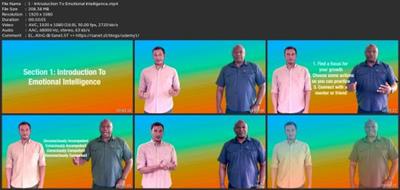
rapidgator.net:
Код:
https://rapidgator.net/file/b25644dd7431ae406a198952351f5e88/ugpck.Emotional.Intelligence.Practice..Mastery.part1.rar.html
https://rapidgator.net/file/b318869dd41217ab253a6f3c0de5bd04/ugpck.Emotional.Intelligence.Practice..Mastery.part2.rar.html
https://rapidgator.net/file/c65f948d280f242e805bc26f24704895/ugpck.Emotional.Intelligence.Practice..Mastery.part3.rar.html
nitroflare.com:
Код:
https://nitroflare.com/view/D5032BF481AB7CC/ugpck.Emotional.Intelligence.Practice..Mastery.part1.rar
https://nitroflare.com/view/4B957C77613C322/ugpck.Emotional.Intelligence.Practice..Mastery.part2.rar
https://nitroflare.com/view/972B149A2BB91D5/ugpck.Emotional.Intelligence.Practice..Mastery.part3.rar
|

|

|
 28.03.2024, 10:46
28.03.2024, 10:46
|
#101152
|
|
Местный
Регистрация: 04.10.2017
Сообщений: 103,458
Сказал(а) спасибо: 0
Поблагодарили 6 раз(а) в 6 сообщениях
|
 Experimental Marketing Strategy Basics
Experimental Marketing Strategy Basics
Experimental Marketing Strategy Basics

Published 3/2024
MP4 | Video: h264, 1920x1080 | Audio: AAC, 44.1 KHz
Language: English | Size: 1.83 GB | Duration: 1h 32m
Learn how to set up your company's growth program using the Experimental Marketing methodology.
What you'll learn
Get the foundation to a Growth Strategy methodology (Experimental Marketing) that's reshaping how businesses invest in Sales and Marketing
Develop a business culture built for Growth--we offer rules that change the game along with steps and exercises you can implement today for immediate results
Integrate Growth with the rest of your team in a way that ensures collaboration, synergy, and North Star success
Develop a North Star Metric (NSM) that is simple to measure, directional, cultural, and balanced
Learn about the purpose and structure of a perfect Growth Marketing experiment
Requirements
Foundational knowledge about Inbound - Certified is a plus
Some knowledge about digital marketing tactics such as SEO, social media, and websites
Description
"Experimental Marketing" is a templatized approach to Growth marketing. It's both experimental and agile.Like any Growth methodology, it involves a wide array of contributors, from your visionary leaders and practitioners to everybody in-between.Growing a business and building a strategic plan all while maintaining a healthy culture within a team can be overwhelming. Most companies struggle to make Growth Marketing of any kind operate the way they want because, although the concept is proven, it takes structure and discipline to operate successfully. It takes a team effort. And it takes focus on a common, agreed-upon goal.In this course you will learn how to implement both: The cyclical formula that guarantees achievement and the activities that evoke consistency and appropriate response.Unlike any other Growth methodology, in these lessons we're providing the template, process, and rules for engagement: a sequence of collaboration, setup, and strategizing that gets your ideas to market fast.In this Experimental Marketing Basics course, you'll get expert video guidance and templates, tools, and articles. You will also learn about the philosophy and basic framework for our Growth methodology, "Experimental Marketing". The course is taught by seasoned experts who have been achieving success and growth for their clients for over 20 years.
Overview
Section 1: Introduction: Experimental Marketing Strategy Basics Course
Lecture 1 Intro
Section 2: Experimental Marketing Model
Lecture 2 Experimental Marketing Model
Section 3: Culture
Lecture 3 Culture
Section 4: Roles and Responsibilities
Lecture 4 Roles and Responsibilities
Section 5: North Star
Lecture 5 North Star
Section 6: Pirate Metrics
Lecture 6 Pirate Metrics
Section 7: The Experiment
Lecture 7 The Experiment
Section 8: Final Exam
Business executives investing in Growth (Sales & Marketing) who want to get a bigger return on their marketing investments,Bootstrapping business leaders making their first investments in Growth,Marketing leaders in growing departments looking for philosophy and structure to help navigate,Marketing practitioners and consultants participating in a Growth Marketing program,Solopreneur marketers looking to bring more value, structure, and process to client engagements
Screenshots

rapidgator.net:
Код:
https://rapidgator.net/file/5ead5d8fffc4cdeca6904649edc073c3/mxobb.Experimental.Marketing.Strategy.Basics.part1.rar.html
https://rapidgator.net/file/6e6be415882c4f692f4843898af5e893/mxobb.Experimental.Marketing.Strategy.Basics.part2.rar.html
nitroflare.com:
Код:
https://nitroflare.com/view/19C7EE1256F08B5/mxobb.Experimental.Marketing.Strategy.Basics.part1.rar
https://nitroflare.com/view/9D27674FC3D3023/mxobb.Experimental.Marketing.Strategy.Basics.part2.rar
|

|

|
 28.03.2024, 10:47
28.03.2024, 10:47
|
#101153
|
|
Местный
Регистрация: 04.10.2017
Сообщений: 103,458
Сказал(а) спасибо: 0
Поблагодарили 6 раз(а) в 6 сообщениях
|
 Internet of Things for Beginners
Internet of Things for Beginners
Internet of Things for Beginners

Published 3/2024
MP4 | Video: h264, 1280x720 | Audio: AAC, 44.1 KHz, 2 Ch
Language: English | Duration: 34m | Size: 233 MB
Understanding the Basics
What you'll learn
Understand the basic terminologies of IoT.
Differentiate between different types of IoT technologies and devices.
Learn about the different applications of IoT.
Identify the potential benefits and challenges of IoT
Requirements
No experience required. You would learn every thing you need to know about IoT basics in this course.
Description
Welcome to the "Internet of Things for Beginners" course. In this course, we will be diving into the world of the Internet of Things (IoT) and exploring the key concepts, terminology, and impact of IoT on various industries. The IoT is the core component that makes automation possible, whether it is controlling road traffic or improving business decisions. Due to (1) affordability and reliability of accessible sensors (2) Availability of cloud computing services and (3) Advancement in Machine learning and AI technologies, IoT-based improvement in productivity and business operations is now possible.
In this course, we will be covering the fundamentals of IoT, including the technologies and concepts that enable IoT, the different types of IoT devices and applications, and the potential benefits and challenges of IoT. We will also explore the various industries that are currently implementing IoT, such as manufacturing, transportation, healthcare, and smart cities. We will also dive into the security aspect of IoT and how to secure IoT devices and systems.
In this course, you will learn about the basics of IoT, understand IoT devices, and how communication is performed. We will investigate the different use cases and also briefly discuss security and privacy issues surrounding IoT. Hopefully, by the end of this course, you will have a clear understanding of IoT and its applicability in the wider domain.
Who this course is for
Whether you are a tech enthusiast, a student, or a professional looking to expand your knowledge, this course provides a solid foundation for understanding the fundamental concepts and principles of IoT
Homepage:
Код:
https://www.udemy.com/course/iot-for-beginners/
Screenshots
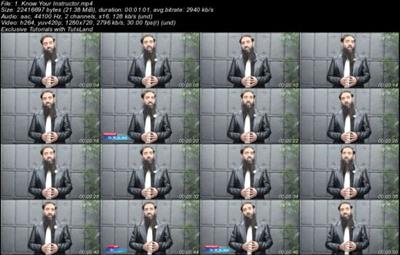
Download link
rapidgator.net:
Код:
https://rapidgator.net/file/683f5738ac0765116d98e82a45b71008/ipkud.Internet.of.Things.for.Beginners.rar.html
nitroflare.com:
Код:
https://nitroflare.com/view/D0BA6D184AEB415/ipkud.Internet.of.Things.for.Beginners.rar
|

|

|
 28.03.2024, 10:48
28.03.2024, 10:48
|
#101154
|
|
Местный
Регистрация: 04.10.2017
Сообщений: 103,458
Сказал(а) спасибо: 0
Поблагодарили 6 раз(а) в 6 сообщениях
|
 Introduction To Finding And Winning Grants
Introduction To Finding And Winning Grants
Introduction To Finding And Winning Grants

Published 3/2024
MP4 | Video: h264, 1920x1080 | Audio: AAC, 44.1 KHz
Language: English | Size: 1.14 GB | Duration: 4h 26m
A Beginner's Guide to Grant Writing
What you'll learn
Understand Grant Types: Learn about federal, state, local, and foundation grants and their purposes.
Grant Research Skills: Gain strategies for finding relevant grants.
Master Grant Writing: Learn to write clear, compelling proposals and create aligned budgets.
Application & Post-Submission: Navigate grantor guidelines and follow-up strategies.
Requirements
No prior skills, experience, tools, or equipment are required to take this course. We've designed this journey to welcome beginners and aim to lower the barrier for anyone interested in mastering the art of finding and winning grants. Whether you're starting from scratch or looking to refine your skills with no previous background, this course is tailored to guide you through every step with clarity and comprehensive support. Join us to embark on a transformative learning experience that opens doors to new opportunities.
Description
Course Title: Introduction to Finding and Winning GrantsCourse Description:Embark on a journey to unlock the secrets of finding and successfully winning grants with our beginner-friendly course. "Introduction to Finding and Winning Grants" is meticulously designed to guide you through the complex landscape of grant opportunities, equipping you with the essential knowledge and skills to enhance your grant acquisition strategies. Ideal for nonprofit organizations, research institutions, and individuals seeking to secure funding, this course lays the groundwork for understanding the multifaceted world of grants.What You Will Learn:Understanding Grants: Discover the basics of what grants are, the various types available, including government, foundation, and corporate grants, and why they are a crucial source of funding.Navigating the Grant Landscape: Learn strategies for researching and identifying potential grants that align with your project or organizational goals.Crafting Winning Proposals: Gain insights into the elements of a compelling grant proposal, from articulating your objectives and methods to creating a detailed and realistic budget.Effective Writing Techniques: Master the art of persuasive grant writing to communicate your project's significance and need compellingly.Post-Submission Strategies: Explore what to do after submitting your proposal, including how to follow up and what steps to take whether you're awarded the grant or need to seek alternatives.Who Should Enroll:This course is perfect for beginners in the grant writing field, staff members of nonprofit organizations aiming to diversify their funding sources, researchers in search of project funding, and anyone interested in learning the fundamentals of grant acquisition.Course Outcome:Participants will emerge from this course with a clear understanding of the grant landscape and the confidence to craft proposals that stand out. By combining practical research strategies with effective writing techniques, you'll be prepared to navigate the grant application process successfully and secure funding for your projects.Join us in "Introduction to Finding and Winning Grants" to take the first step towards grant writing mastery, enhancing your ability to make a tangible impact through successful grant acquisition.
Overview
Section 1: Introduction
Lecture 1 Introduction
Section 2: Module 1 : What Are Grants?
Lecture 2 Introduction
Lecture 3 Government, Foundation, Corporate Grants
Lecture 4 Non Profit Organizations And Grants
Lecture 5 Recap
Section 3: Module 2: How to Find Relevant Grants
Lecture 6 Introduction
Lecture 7 Sources Of Grants
Lecture 8 Searching For Grants
Lecture 9 Tips For Successful Grants Research
Lecture 10 Recap
Section 4: Module 3: Crafting a Winning Grant Proposal
Lecture 11 Introduction
Lecture 12 Proposal Structure
Lecture 13 Wrting Techniques
Lecture 14 Proof Reading And Peer Review
Lecture 15 Common Mistakes In Grfant Writing
Lecture 16 The Art Of Story Telling
Lecture 17 Recap
Section 5: Module 4: Recapping Expert Grant Writing Tips
Lecture 18 Introduction
Lecture 19 Recap To Expert Grant Writing Tips
Section 6: Module 5: Navigating Grant Deadlines
Lecture 20 Introduction
Lecture 21 Strategies For Meeting Deadlines
Lecture 22 Recap
Section 7: Module 6: Diverse Grant Funding Sources
Lecture 23 Introduction
Lecture 24 Government Agencies, Foundations, Corporations
Lecture 25 Specialized Grants Sources
Lecture 26 Recap
Section 8: Module 7: Grant Writing Best Practices
Lecture 27 Introduction
Lecture 28 Effective Strategies In Grant Proposals
Lecture 29 Optimizing Grant Application Processes
Lecture 30 Adapting To Different Grantor Requirements
Lecture 31 Measuring And Demonstrating Impact
Lecture 32 Continuous Improvement In Grant Writing
Lecture 33 Dealing With Setbacks And Challenges
Lecture 34 Recap
Section 9: Module 8: Advanced Techniques In Grant Writing
Lecture 35 Introduction
Lecture 36 Strategic Proposal Positioning
Lecture 37 Innovative Narrative Development
Lecture 38 Data-driven Decision Making
Lecture 39 Customized Budgeting Strategies
Lecture 40 Strategies For Complex Collaborations
Lecture 41 Recap
Section 10: Thank You!
Lecture 42 Thank You!
This course is meticulously designed for nonprofit professionals, small business owners, educators, researchers, and members of community organizations who are on the quest to secure funding through grants. It's tailored for individuals and teams driven to initiate, support, or expand projects with the aid of external financial backing. Whether you're navigating the grant writing process for the first time or you're an adept professional aiming to enhance your grant acquisition strategies, this course provides an all-encompassing framework to elevate your skills. From understanding the grant landscape to mastering the art of persuasive proposal writing, our course equips you with the knowledge and tools essential for success. Entrepreneurs, project managers, and volunteers alike will find this training invaluable in unlocking funding opportunities and achieving measurable impacts in their respective arenas. Embark on this journey with us to transform your grant writing abilities and propel your projects to new heights.
Screenshots
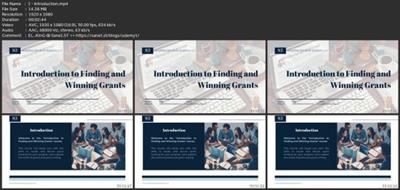
rapidgator.net:
Код:
https://rapidgator.net/file/a5868f300045f0a981dc5ff25a0caee4/yhjyw.Introduction.To.Finding.And.Winning.Grants.part1.rar.html
https://rapidgator.net/file/56d2816e55e5489cf4c87fb06a3eb53d/yhjyw.Introduction.To.Finding.And.Winning.Grants.part2.rar.html
nitroflare.com:
Код:
https://nitroflare.com/view/556DBF9381AD519/yhjyw.Introduction.To.Finding.And.Winning.Grants.part1.rar
https://nitroflare.com/view/5BE8C3F1A6310B3/yhjyw.Introduction.To.Finding.And.Winning.Grants.part2.rar
|

|

|
 28.03.2024, 10:49
28.03.2024, 10:49
|
#101155
|
|
Местный
Регистрация: 04.10.2017
Сообщений: 103,458
Сказал(а) спасибо: 0
Поблагодарили 6 раз(а) в 6 сообщениях
|
 Introduction To Javascript From Basic To Advanced 2024
Introduction To Javascript From Basic To Advanced 2024
Introduction To Javascript From Basic To Advanced 2024

Published 3/2024
MP4 | Video: h264, 1920x1080 | Audio: AAC, 44.1 KHz
Language: English | Size: 1.62 GB | Duration: 6h 36m
A comprehensive JavaScript course designed for all skill levels! Gain mastery in JavaScript! Become Zero to Expert
What you'll learn
JavaScript fundamentals: variables, if/else, operators, boolean logic, functions, arrays, objects, loops, strings, etc.
Modern ES6+ from the beginning: arrow functions, spread operator, optional chaining (ES2020), etc.
Modern OOP: Classes, constructors, prototypal inheritance, encapsulation, etc.
Asynchronous JavaScript : Event loop, promises, async/await, AJAX calls and APIs
Become an advanced, confident, and modern JavaScript developer from scratch
Build a beautiful real-world project for your portfolio
Become job-ready by understanding how JavaScript, Complex concepts like the 'this' keyword,
JavaScript Best Practices and Common Mistakes to avoid
Practice your skills with quiz and coding challenges
Get fast and friendly support in the Q&A area
Design your unique learning path according to your Need!
Requirements
You don't need any prior coding experience to enroll in this course! I'll guide you from novice to advanced.
You can use any computer and operating system-whether it's Windows, macOS, or Linux. We'll help you set up your text editor during the course.
While a basic grasp of HTML and CSS is advantageous, it's not mandatory!
Description
Why Choose This JavaScript Course?Discover why this JavaScript course is perfect for you:This course offers the most comprehensive and detailed JavaScript training available on Udemy, and possibly even across the entire internet. It's a complete package that starts from the fundamentals of JavaScript and progresses to building modern, intricate applications.You'll learn modern JavaScript right from the start, with step-by-step guidance through practical and enjoyable code examples, essential theoretical concepts, and comprehensive projects.By completing this course, you'll be well-prepared to advance to learning advanced front-end frameworks like React, Vue, Angular, or Svelte.In addition to mastering technical skills, you'll also gain valuable developer mindset, planning, architectural, and debugging skills necessary for real-world application development.Unlike other courses, this one covers beginner, intermediate, advanced, and even expert topics, eliminating the need to purchase additional courses to fully master JavaScript.However, you have the flexibility to focus only on the topics that interest you. This course is extensive, as it encompasses "The Complete JavaScript Course," essentially offering multiple courses in one. But rest assured, it's designed in a modular way with pathways for accelerated learning.Upon completing the course, you'll possess the knowledge and confidence needed to excel in job interviews and establish yourself as a professional developer.Why Choose Me as Your JavaScript Instructor?Here's why I'm the ideal JavaScript teacher for you:I'm Ayan, an experienced web developer and designer with over 8 years of industry-level expertise in JavaScript, React, and Next.js.With my understanding of how students learn JavaScript and what they require to master it, I've meticulously crafted the curriculum for this course to meet those needs. It's a unique combination of real-world projects, thorough explanations, theoretical lectures, and challenges that can transform you from a beginner to an expert JavaScript developer in just a few weeks.What's Covered in the Course?Here's a glimpse into what you'll learn:• Create portfolio-worthy projects where you'll master application planning and architecture using flowcharts and common JavaScript patterns.• Master the foundational aspects of JavaScript : variables, conditionals, operators, functions, arrays, objects, loops, strings, and more.• Dive into modern JavaScript (ES6+), covering topics like arrow functions, destructuring, spread operator, default arguments, optional chaining, and more.• Gain insights into how JavaScript operates under the hood: engines, the call stack, hoisting, scoping, the 'this' keyword, reference values, and more.• Explore functions deeply, including arrow functions, first-class and higher-order functions, bind, and closures.• Delve into object-oriented programming, covering prototypal inheritance, constructor functions, classes, encapsulation, abstraction, inheritance, and polymorphism.• Learn about asynchronous JavaScript, including the event loop, promises, async/await, and error handling, and apply these concepts to accessing data from third-party APIs through AJAX calls.Additionally, you'll receive:• High-definition videos that are easy to navigate and search through.• Over 10 coding challenges and 15 assignments to reinforce your newfound skills.Does any of this resonate with you? If so, embark on this journey today and join me in mastering JavaScript.
Overview
Section 1: Introduction
Lecture 1 Introduction to JavaScript and History of JavaScript
Lecture 2 Setting up the Environment
Lecture 3 JavaScript Symbols & Syntax
Section 2: Functions in JavaScript
Lecture 4 Basics of Functions in JavaScript
Lecture 5 Self Invoking Function, Default Values, Rest Parameter & Arguments
Lecture 6 Call method, Apply method, bind and concept of 'this' in Function
Section 3: JavaScript Class
Lecture 7 Introduction to JS Class
Lecture 8 Class Inheritance
Lecture 9 Class Getters & Setters
Lecture 10 Class Hoisting & Static Method
Section 4: Data Types in JavaScript
Lecture 11 Basics about JS Data Types
Lecture 12 Arithmetic Operations ,String Operations & Operator Precedence
Lecture 13 Logical & Bitwise Operators
Lecture 14 More about operators
Section 5: Concepts of String in JavaScript
Lecture 15 Basics about JS String & String Templates
Lecture 16 ChatAt ,CharCodeAt and AT methods & Property Access
Lecture 17 Slice, Substring, trim, Padding & Repeat methods
Lecture 18 Replace operation and array conversion of string
Lecture 19 String Search Operations
Section 6: Things to Know about Array in JS
Lecture 20 Introduction to JS Array
Lecture 21 Push, Pop, Shift , Unshift, Slice & Splice methods in Array
Lecture 22 Array Serach & Sorting Methods
Section 7: Conditional Statements & Iterables
Lecture 23 Basics about Conditional Statements
Lecture 24 Iteration using FOR loop
Lecture 25 While , Do While, Break & Continue statements
Lecture 26 JavaScript SET
Lecture 27 JavaScript MAP
Section 8: Usages of Date Object , Math Object , Random & Regex
Lecture 28 JavaScript Math Object
Lecture 29 JavaScript DATE Object
Lecture 30 Regular Expression in JavaScript
Section 9: HTML Document Object Model (DOM) Concepts
Lecture 31 Introduction to JavaScript HTML DOM
Lecture 32 Where to write JavaScript in HTML
Lecture 33 HTML Dom finding using JavaScript
Lecture 34 Change DOM elements using JavaScript
Lecture 35 Add/Delete DOM elements
Lecture 36 More about dynamic DOM & form Validation
Lecture 37 Animations in JavaScript
Section 10: Basics of Browser Object Model (BOM)
Lecture 38 Introduction to Browser Object Model
Lecture 39 Window Screen Object
Lecture 40 Window Location Object
Lecture 41 Window History Object
Lecture 42 Window Navigator Object
Lecture 43 Window Prompt Boxes
Lecture 44 Window Timeout Events
Lecture 45 JavaScript Cookie
Section 11: JavaScript Async Functions
Lecture 46 Introduction to CallBack function
Lecture 47 JavaScript Asynchronous Method
Lecture 48 Promise in JavaScript
Lecture 49 JavaScript Async Await
Section 12: JavaScript Web APIs
Lecture 50 Introduction to WEB API
Lecture 51 JavaScript Validation API
Lecture 52 More About Web API
Section 13: How to use AJAX & JSON
Lecture 53 Introduction to AJAX
Lecture 54 XMLHttpRequest Method & Its Properties
Lecture 55 What is JSON?
Lecture 56 JSON Object Literal and how to get json from server
Section 14: How to use Graphs and Common Mistakes & Best Practices
Lecture 57 How to use Graphs and Chats in JavaScript
Lecture 58 Few mistakes to avoid and best practices
Lecture 59 Exercise: Create a Calculator application with Login Page
Section 15: Exercise Solution & Final Course Test
Lecture 60 Exercise Solution Part 1
Lecture 61 Exercise Solution Part 2
Lecture 62 Exercise Solution Part 3
Enroll in this course if you aim to develop a comprehensive and profound comprehension of JavaScript.,Consider taking this course if you've been endeavouring to grasp JavaScript but haven't attained a genuine understanding yet, or still lack the confidence to develop real applications.,This course is suitable if you're intrigued by utilizing a library/framework such as React, Angular, Vue, or Node down the line,If you're already familiar with JavaScript and seeking an advanced curriculum, this course covers expert-level topics!,If you're eager to embark on your programming journey, JavaScript serves as an excellent inaugural language-making this course an ideal starting point!
Screenshots
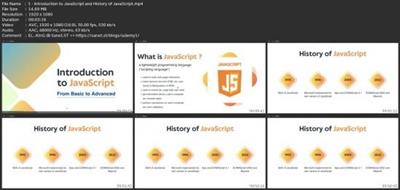
rapidgator.net:
Код:
https://rapidgator.net/file/1a8321a271e0fb77136a9dd8ba64d81c/uwszh.Introduction.To.Javascript.From.Basic.To.Advanced.2024.part1.rar.html
https://rapidgator.net/file/77f92b48b2135f72ed03154c2ad5e903/uwszh.Introduction.To.Javascript.From.Basic.To.Advanced.2024.part2.rar.html
nitroflare.com:
Код:
https://nitroflare.com/view/78FB30D7A582D48/uwszh.Introduction.To.Javascript.From.Basic.To.Advanced.2024.part1.rar
https://nitroflare.com/view/3D87427A7F45762/uwszh.Introduction.To.Javascript.From.Basic.To.Advanced.2024.part2.rar
|

|

|
 28.03.2024, 10:51
28.03.2024, 10:51
|
#101156
|
|
Местный
Регистрация: 04.10.2017
Сообщений: 103,458
Сказал(а) спасибо: 0
Поблагодарили 6 раз(а) в 6 сообщениях
|
 Landing your dream job in digital marketing Interview Q&A
Landing your dream job in digital marketing Interview Q&A
Landing your dream job in digital marketing: Interview Q&A

Published 3/2024
MP4 | Video: h264, 1280x720 | Audio: AAC, 44.1 KHz, 2 Ch
Language: English | Duration: 1h 44m | Size: 1.8 GB
Nail Your Digital Marketing Interview: Land Your Dream Job (or Clients)!
What you'll learn
How to properly craft a digital marketing CV no matter your level of experience
How to optimize your LinkedIn profile
How to get remote jobs in digital marketing
Becoming a freelance digital marketer
100 interview question and answers you should know
Requirements
You need practical knowledge of digital marketing, and you should have completed the digital marketing professional training program on Udemy
Description
Struggling to land your dream digital marketing job, even after acquiring valuable skills? You're not alone. This course unlocks the secrets to interview success and equips you to confidently compete in a competitive market.
Whether you're a complete beginner or an experienced marketer, this course provides a step-by-step roadmap to navigate the job application process and stand out from the crowd.
Here's what you'll learn
Avoid common pitfalls: Discover the key reasons why new digital marketers get overlooked, and how to craft a compelling application that gets noticed.
Master the interview: Learn effective strategies to answer common and challenging questions, showcase your expertise, and impress hiring managers.
Craft a winning CV: Structure your resume to highlight your digital marketing skills and achievements in a clear and impactful way based on job requirements.
Land remote opportunities: Explore the booming world of remote digital marketing jobs and discover how to position yourself for success.
Build your freelance hustle: Learn valuable strategies to attract clients and launch your own successful digital marketing agency.
By the end of this course, you'll be armed with the knowledge, confidence, and practical tools to land your dream digital marketing job or launch your own thriving freelance business.
Who this course is for
Beginners, Intermediate and Advanced Digital Marketers looking for jobs
Individuals looking to start a career in digital marketing
HR professionals looking to hire digital marketing experts
Homepage:
Код:
https://www.udemy.com/course/landing-your-dream-job-in-digital-marketing-interview-qa/
Screenshots

rapidgator.net:
Код:
https://rapidgator.net/file/528839178411447e431cc93300a0e7f1/vzxee.Landing.your.dream.job.in.digital.marketing.Interview.QA.part1.rar.html
https://rapidgator.net/file/06cd712728ffc72c8aaafcc13ab09416/vzxee.Landing.your.dream.job.in.digital.marketing.Interview.QA.part2.rar.html
nitroflare.com:
Код:
https://nitroflare.com/view/E9FF31637106C4F/vzxee.Landing.your.dream.job.in.digital.marketing.Interview.QA.part1.rar
https://nitroflare.com/view/84BEA5F7E8FBD56/vzxee.Landing.your.dream.job.in.digital.marketing.Interview.QA.part2.rar
|

|

|
 28.03.2024, 10:52
28.03.2024, 10:52
|
#101157
|
|
Местный
Регистрация: 04.10.2017
Сообщений: 103,458
Сказал(а) спасибо: 0
Поблагодарили 6 раз(а) в 6 сообщениях
|
 Learn Protege - Ontology Editor - Through Pizza.Owl Tutorial
Learn Protege - Ontology Editor - Through Pizza.Owl Tutorial
Learn Protege - Ontology Editor - Through Pizza.Owl Tutorial

Published 3/2024
MP4 | Video: h264, 1920x1080 | Audio: AAC, 44.1 KHz
Language: English | Size: 1.69 GB | Duration: 2h 55m
Learn Protégé (Open Source Ontology Editor) by Practicing on Ontology Modeling
What you'll learn
Familiar Protégé which as the Open Source ontology editing tool
Know how to install, configure and use Protégé for ontology modeling
Grasp pizza owl ontology and using its tutorial for making one real life ontology model
Understand key Semantic and Ontology concept and able to use that for modelling self ontologies
Requirements
No programming experience required; better to know basic set theory
Description
The Protégé is one opensource ontology editor. Mr. Michael DeBellis created one great tutorial using pizza.owl as sample to show how Protégé is working. This course is based on the latest version of tutorial (which you can find link in the course) and guide you step by step to make the pizza.owl ontology created and practice the needed skills (query, rules, etc.) which are crucial for you to use in other ontology, knowledge graphs. Numbers of hands-on exercises are given with detail demo so that you can catch up the knowledge as soon as possible.During course, you'll learn how to initialize the Protege editing environment, then we move to the key elements within one ontology, explaining the concepts of Class and Individual, introduce the object property and data property, domains and ranges.With the new created pizza.owl ontology, you'll exercise on the restrictions, reasoner, SWRL, SHACL.Ontology is becoming powerful when you can easily querying the information, within the course, you'll learn DL (Description Logic) queries as well as hands-on SPARQL queries. (I'll post specific course later for dedicated SPARQL learning.)We'll also introduce the Web Protege if you have interests to work in the web based only.
Overview
Section 1: Introduction
Lecture 1 Introduction and Opening
Lecture 2 Structure on pizza.owl case study
Lecture 3 Initialize Protege Environment
Section 2: Building an OWL Ontology - Understand Class and Class Hierarchy
Lecture 4 Create New Owl Ontology
Lecture 5 Named Classes
Lecture 6 Using a Reasoner
Lecture 7 Disjoint Classes
Lecture 8 Understand Ontology Model File Structure[RDF]
Lecture 9 Using Create Class Hierarchy
Section 3: Understand Properties in Ontology
Lecture 10 OWL Properties
Lecture 11 Inverse Properties
Lecture 12 Owl Object Property Characteristics
Lecture 13 OWL Property Domains and Ranges
Lecture 14 Existential Restrictions
Section 4: Adding More Context into Pizza.owl Ontology
Lecture 15 Creating Subclasses of Pizza with Exercise 14
Lecture 16 Creating Subclasses of Pizza with Exercise 15
Lecture 17 Creating Subclasses of Pizza with Exercise 16
Lecture 18 Creating Subclasses of Pizza with Exercise 17
Lecture 19 Creating Subclasses of Pizza with Exercise 18
Lecture 20 Detecting a Class that can't Have Members
Anyone interests on ontology and willing to learn new tool/skills
Screenshots
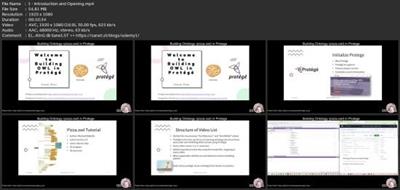
rapidgator.net:
Код:
https://rapidgator.net/file/c7077e217542ce06b8228eca11759ed0/jydys.Learn.Protege..Ontology.Editor..Through.Pizza.Owl.Tutorial.part1.rar.html
https://rapidgator.net/file/00b3df470bf1bf87c8ec20970d5b0e11/jydys.Learn.Protege..Ontology.Editor..Through.Pizza.Owl.Tutorial.part2.rar.html
nitroflare.com:
Код:
https://nitroflare.com/view/99858DFA42376E4/jydys.Learn.Protege..Ontology.Editor..Through.Pizza.Owl.Tutorial.part1.rar
https://nitroflare.com/view/76BC5B0465EEE87/jydys.Learn.Protege..Ontology.Editor..Through.Pizza.Owl.Tutorial.part2.rar
|

|

|
 28.03.2024, 10:53
28.03.2024, 10:53
|
#101158
|
|
Местный
Регистрация: 04.10.2017
Сообщений: 103,458
Сказал(а) спасибо: 0
Поблагодарили 6 раз(а) в 6 сообщениях
|
 Masterclass Of Rural And Regional Development
Masterclass Of Rural And Regional Development
Masterclass Of Rural And Regional Development

Published 3/2024
MP4 | Video: h264, 1920x1080 | Audio: AAC, 44.1 KHz
Language: English | Size: 3.29 GB | Duration: 3h 9m
Become community development specialist after completing the course. Learn project development theories and approaches
What you'll learn
Introduce to Rural and Regional development
Rural Development Concept and Theories
Development Approach
Development Challenges and Opportunity
Rural Livelihood and Sustainable Development
Natural Resource Management and Conservation in Rural
Rural Regional Development Strategic Components
Participatory Approaches for Rural and Regional Development
Public Private Partnerships and Rural Development
Monitoring and Evaluation of Rural and Regional Development
Requirements
No experience required. You will learn what you want!
Description
This comprehensive course on Mastering Rural and Regional Development (RRD) is designed to provide participants with a deep understanding of the key concepts, theories, challenges, and opportunities associated with rural and regional development. The program is structured into several modules, each focusing on essential aspects that contribute to the holistic understanding and effective implementation of development strategies in rural and regional contexts.Introduction to Rural and Regional Development:Overview of rural and regional developmentHistorical perspectives and evolution of rural developmentimportance of rural and regional development in global contextsRural Development Concepts and Theories:Exploration of various concepts and theories shaping rural developmentComparative analysis of different approaches and their applicabilityUnderstanding the role of stakeholders in rural developmentDevelopment Approach:Examination of different development approaches and their impactCase studies illustrating successful development approachesIntegration of sustainable and inclusive practices in developmentDevelopment Challenges and Opportunities:Identification and analysis of challenges in rural and regional developmentExploration of opportunities for sustainable developmentStrategies for overcoming obstacles and leveraging opportunitiesRural Livelihood and Sustainable Development:Analysis of rural livelihood systemsIntegration of sustainability principles in rural developmentBest practices for fostering sustainable rural livelihoodsNatural Resource Management and Conservation in Rural Areas:Understanding the significance of natural resources in rural developmentStrategies for sustainable natural resource managementConservation practices for promoting environmental sustainabilityRural Regional Development Strategic Components:Examination of key components influencing rural and regional developmentFormulation of strategic plans for comprehensive developmentCase studies highlighting successful regional development initiativesParticipatory Approaches for Rural and Regional Development:Importance of community participation in development projectsTools and methodologies for participatory planning and decision-makingEmpowering local communities for sustainable development outcomesPublic Private Partnerships and Rural Development:Understanding the role of public-private collaborations in rural developmentCase studies showcasing successful partnershipsStrategies for effective implementation of PPP modelsMonitoring and Evaluation of Rural and Regional Development  esigning effective monitoring and evaluation frameworksMeasurement of development outcomes and impact assessmentContinuous improvement and adaptive management in development projectsThis Mastering Rural and Regional Development course combines theoretical insights with practical applications, equipping participants with the knowledge and skills necessary to address the complex challenges of rural and regional development in diverse contexts. Through engaging lectures, case studies, and interactive discussions, participants will gain the expertise needed to contribute meaningfully to the sustainable development of rural and regional areas.
Overview
Section 1: Introduction to Rural and Regional Development
Lecture 1 Meaning of Rural and Regional Definition
Lecture 2 Type of Regions
Lecture 3 Geopolitical Theory
Lecture 4 Structure of Rural Communities
Lecture 5 Resource for downloading
Section 2: Module 1: Concept, Theories and Approach
Lecture 6 Rural Development - Concept and theories
Lecture 7 Regional Development - Concept and theories
Lecture 8 Rural and Regional Development Approaches
Section 3: Module 2: Regional Development Challenges and Opportunities
Lecture 9 What are Challenges?
Lecture 10 What are Opportunity?
Lecture 11 Resource For Downloading
Section 4: Module 3: Rural Livelihood and Sustainable Development
Lecture 12 Introduction to Rural Livelihood and Sustainable Development
Lecture 13 Concept and theories of Rural livelihood
Lecture 14 Concept and Theories of Sustainable Development
Lecture 15 Resources For Download
Section 5: Module 4: Strategic Components of Rural and Regional Development
Lecture 16 Economic Dimension
Lecture 17 Socio-cultural Dimension
Lecture 18 Political-institutional Dimension
Lecture 19 Ecological Dimension
Lecture 20 Documents For Downloading
Section 6: Related Course
Lecture 21 Monitoring and Evaluation in Development Projects
NGO and Private Sector Staffs,Government Officials,International Study Student
Screenshots
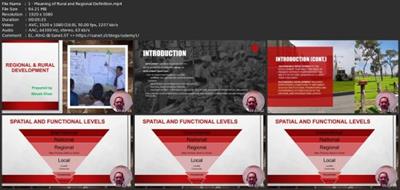
rapidgator.net:
Код:
https://rapidgator.net/file/095e13d69fd4fd8b3cfea51a6896a210/yukcx.Masterclass.Of.Rural.And.Regional.Development.part1.rar.html
https://rapidgator.net/file/4ef7e15828f175639621a5bbd3c7ff97/yukcx.Masterclass.Of.Rural.And.Regional.Development.part2.rar.html
https://rapidgator.net/file/c8e2c67cebdd2b7c477457a8d3ce02b5/yukcx.Masterclass.Of.Rural.And.Regional.Development.part3.rar.html
https://rapidgator.net/file/262c662e1afa8b8097413eea010e9df4/yukcx.Masterclass.Of.Rural.And.Regional.Development.part4.rar.html
nitroflare.com:
Код:
https://nitroflare.com/view/3FB029E4531445D/yukcx.Masterclass.Of.Rural.And.Regional.Development.part1.rar
https://nitroflare.com/view/46E2C08C2490063/yukcx.Masterclass.Of.Rural.And.Regional.Development.part2.rar
https://nitroflare.com/view/A85DDC8BCAD6A1C/yukcx.Masterclass.Of.Rural.And.Regional.Development.part3.rar
https://nitroflare.com/view/6E6B035275E3D7A/yukcx.Masterclass.Of.Rural.And.Regional.Development.part4.rar
|

|

|
 28.03.2024, 10:54
28.03.2024, 10:54
|
#101159
|
|
Местный
Регистрация: 04.10.2017
Сообщений: 103,458
Сказал(а) спасибо: 0
Поблагодарили 6 раз(а) в 6 сообщениях
|
 Mastering Qualitative Research Data Collection To Analysis
Mastering Qualitative Research Data Collection To Analysis
Mastering Qualitative Research: Data Collection To Analysis

Published 3/2024
MP4 | Video: h264, 1920x1080 | Audio: AAC, 44.1 KHz
Language: English | Size: 1.12 GB | Duration: 2h 18m
Qualitative Research Fundamentals, Ethical considerations, dilemas and resolution,
What you'll learn
To introduce participants to the foundational principles and theories of qualitative research.
To familiarize participants with various qualitative research methods and techniques for data collection.
To equip participants with the knowledge and skills to analyze qualitative data using appropriate methodologies.
To enable participants to interpret and make meaning of qualitative research findings effectively.
To empower participants to critically evaluate and enhance the rigor and trustworthiness of qualitative research.
Requirements
No prior experience with qualitative research is required, but familiarity with research terminology and concepts will be beneficial.
Participants are expected to have a basic understanding of research principles and methodologies.
Description
In the ever-evolving landscape of research methodologies, qualitative research stands as a cornerstone for delving into the intricate nuances of human behavior, perceptions, and experiences. This course is designed to equip you with the essential tools and knowledge needed to navigate the rich tapestry of qualitative inquiry, from the inception of data collection to the culmination of insightful analysis.Throughout this journey, you will embark on a comprehensive exploration of qualitative research fundamentals,. Whether you're a novice researcher seeking to grasp the foundational principles or an experienced scholar aiming to refine your skills, this course offers a dynamic and immersive learning experience tailored to meet your needs.From understanding the philosophical underpinnings of qualitative research to mastering diverse data collection ,analysis and interpretation techniques, you will gain a deep appreciation for the art and science of qualitative inquiry. You will also understand the Ethical Considerations and dilemmas in Qualitative Research and how to resolve it.By the end of this course, you will emerge as a proficient practitioner of qualitative research, equipped with the expertise to design, execute, and interpret qualitative studies with confidence and precision. Whether you aspire to contribute to academia, inform policy decisions, or drive innovation in your respective field, the skills acquired in this course will empower you to make meaningful and impactful contributions to the world of research and beyond.Get ready to embark on an enlightening journey into the realm of qualitative research, where every observation, every interview, and every insight serves as a stepping stone toward deeper understanding and discovery.
Overview
Section 1: WELCOME AND INTRODUCTION TO THE COURSE
Lecture 1 WELCOME AND INTRODUCTION TO THE COURSE
Section 2: DEFINITION AND CHARACTERISTICS OF QUALITATIVE RESEARCH
Lecture 2 DEFINITION AND CHARACTERISTICS OF QUALITATIVE RESEARCH
Section 3: PHILOSOPHICAL UNDERPINNINGS- POSITIVISM VS. INTERPRETIVISM
Lecture 3 PHILOSOPHICAL UNDERPINNINGS- POSITIVISM VS. INTERPRETIVISM
Section 4: THEORETICAL FRAMEWORKS IN QUALITATIVE RESEARCH
Lecture 4 THEORETICAL FRAMEWORKS IN QUALITATIVE RESEARCH
Section 5: CONSIDERATIONS FOR CHOOSING A QUALITATIVE RESEARCH APPROACH
Lecture 5 CONSIDERATIONS FOR CHOOSING A QUALITATIVE RESEARCH APPROACH
Section 6: SAMPLING TECHNIQUES IN QUALITATIVE RESEARCH
Lecture 6 SAMPLING TECHNIQUES IN QUALITATIVE RESEARCH
Section 7: DATA COLLECTION METHODS IN QUALITATIVE RESEARCH
Lecture 7 DATA COLLECTION METHODS IN QUALITATIVE RESEARCH
Section 8: DATA ANALYSIS IN QUALITATIVE RESEARCH
Lecture 8 DATA ANALYSIS IN QUALITATIVE RESEARCH
Section 9: STRATEGIES ENHANCING CREDIBILITY, TRANSFERABILITY, DEPENDABILITYLITY& CONFIRMAB
Lecture 9 STRATEGIES ENHANCING CREDIBILITY, TRANSFERABILITY, DEPENDABILITY& CONFIRMABILITY
Section 10: REFLEXIVITY AND RESEARCHER BIAS
Lecture 10 REFLEXIVITY AND RESEARCHER BIAS
Section 11: MEMBER CHECKING AND TRIANGULATION-ENHANCING THE VALIDITY&RELIABILITY OF FINDINGS
Lecture 11 MEMBER CHECKING AND TRIANGULATION-ENHANCING THE VALIDITY&RELIABILITY OF FINDINGS
Section 12: INTERPRETATION AND SYNTHESIS OF QUALITATIVE DATA
Lecture 12 INTERPRETATION AND SYNTHESIS OF QUALITATIVE DATA
Section 13: COMMUNICATING QUALITATIVE RESEARCH FINDINGS EFFECTIVELY
Lecture 13 COMMUNICATING QUALITATIVE RESEARCH FINDINGS EFFECTIVELY
Section 14: USING QUOTES, NARRATIVES, AND VISUALS TO ILLUSTRATE FINDINGS
Lecture 14 USING QUOTES, NARRATIVES, AND VISUALS TO ILLUSTRATE FINDINGS
Section 15: ETHICAL CONSIDERATIONS IN QUALITATIVE RESEARCH
Lecture 15 ETHICAL CONSIDERATIONS IN QUALITATIVE RESEARCH
Section 16: ETHICAL DILEMMAS IN QUALITATIVE RESEARCH
Lecture 16 ETHICAL DILEMMAS IN QUALITATIVE RESEARCH
Section 17: APPLICATION OF QUALITATIVE RESEARCH IN VARIOUS DISCIPLINES
Lecture 17 APPLICATION OF QUALITATIVE RESEARCH IN VARIOUS DISCIPLINES
Section 18: Examples illustrating the use of Qualitative Research Methods
Lecture 18 Examples illustrating the use of Qualitative Research Methods
Section 19: CONCLUSION AND LIST OF FURTHER READING MATERIALS
Lecture 19 CONCLUSION AND LIST OF FURTHER READING MATERIALS
Undergraduate and graduate students,Early-career researchers and professionals seeking to enhance their qualitative research skills.,Anyone interested in understanding qualitative research methodologies and their application in various contexts.
Screenshots
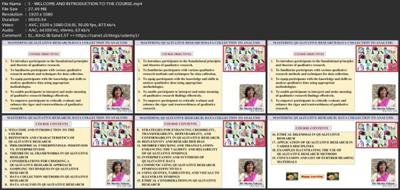
rapidgator.net:
Код:
https://rapidgator.net/file/20eeb3ed45eedd398a09b36dd4ce6798/zyekr.Mastering.Qualitative.Research.Data.Collection.To.Analysis.part1.rar.html
https://rapidgator.net/file/cf8776bf0172a3a83c2446f2d78388a5/zyekr.Mastering.Qualitative.Research.Data.Collection.To.Analysis.part2.rar.html
nitroflare.com:
Код:
https://nitroflare.com/view/7F1BFC819D0B0BA/zyekr.Mastering.Qualitative.Research.Data.Collection.To.Analysis.part1.rar
https://nitroflare.com/view/92F7C5E9C6F1349/zyekr.Mastering.Qualitative.Research.Data.Collection.To.Analysis.part2.rar
|

|

|
 28.03.2024, 10:55
28.03.2024, 10:55
|
#101160
|
|
Местный
Регистрация: 04.10.2017
Сообщений: 103,458
Сказал(а) спасибо: 0
Поблагодарили 6 раз(а) в 6 сообщениях
|
 Mastering Us Gaap A Guide To Financial Reporting Standards
Mastering Us Gaap A Guide To Financial Reporting Standards
Mastering Us Gaap: A Guide To Financial Reporting Standards

Published 3/2024
MP4 | Video: h264, 1920x1080 | Audio: AAC, 44.1 KHz
Language: English | Size: 3.24 GB | Duration: 10h 57m
Dive deep into financial reporting standards and advanced accounting practices in this US GAAP Mastery course
What you'll learn
Principles and applications of US Generally Accepted Accounting Principles (GAAP).
Financial statement presentation under US GAAP.
Revenue recognition principles according to US GAAP.
Inventory valuation methods and their application.
Treatment of intangible assets in financial reporting.
Understanding liabilities and their presentation in financial statements.
Equity accounting and its implications.
Application of ASC sections for comprehensive financial reporting.
Analysis of complex accounting scenarios using practical examples.
Interpreting accounting standards and their impact on financial statements.
Requirements
Basic understanding of accounting principles. Familiarity with financial statements. Knowledge of basic financial accounting terminology.
Proficiency in using accounting software (preferred but not mandatory). Ability to interpret and analyze numerical data. Understanding of business transactions and their impact on financial statements.
Basic knowledge of corporate finance concepts (preferred but not mandatory).
Access to relevant accounting standards and guidelines (e.g., US GAAP).
Description
Welcome to our comprehensive course on US Generally Accepted Accounting Principles (GAAP). In this course, we will delve deep into the intricacies of US GAAP, providing you with a thorough understanding of its principles and applications in financial reporting.Throughout this course, you will embark on a journey through various sections, each focusing on different aspects of US GAAP standards and regulations. From the fundamental principles to complex accounting treatments, you will explore topics ranging from financial statement presentation to revenue recognition, equity accounting to consolidation, and much more.Whether you are a student aiming to build a strong foundation in accounting principles, a professional seeking to enhance your understanding of US GAAP for career advancement, or an individual interested in gaining insights into financial reporting standards, this course is designed to meet your learning needs.Our engaging lectures, practical examples, and real-world case studies will provide you with the knowledge and skills necessary to navigate the complexities of US GAAP effectively. By the end of this course, you will emerge with a comprehensive understanding of US GAAP, empowering you to apply these principles with confidence in various accounting scenarios.Join us on this educational journey as we unravel the intricacies of US GAAP and equip you with the expertise needed to excel in the field of accounting and finance. Let's embark on this learning adventure together!Section 1: Introduction OverviewIn this introductory section, participants delve into the foundational aspects of US GAAP, gaining insight into its historical evolution, core principles, and overall significance in the realm of accounting and financial reporting. Through a comprehensive exploration, learners familiarize themselves with the fundamental concepts that underpin the subsequent discussions on ASC standards.Section 2: US GAAP: ASC 105 - GAAP History and HierarchyParticipants embark on a journey through the origins and development of US GAAP, tracing its evolution from its inception to the present day. They explore the intricate hierarchy of GAAP, understanding the roles played by various entities such as the Financial Accounting Standards Board (FASB) in setting and maintaining these standards.Section 3: US GAAP: ASC 205 - Presentation of Financial StatementsIn this section, learners are introduced to the essential principles governing the presentation of financial statements according to ASC 205. Through detailed discussions and illustrative examples, participants grasp the intricacies of comparative financial statements, discontinued operations, and the distinction between liquidation and going concern presentations.Section 4: US GAAP: ASC 210 - Balance SheetHere, participants delve into the nuances of ASC 210, focusing on the balance sheet. They gain a comprehensive understanding of the components of the balance sheet, including assets, liabilities, and equity. Through practical examples and case studies, learners analyze classified balance sheets and interpret the financial position of an organization.Section 5: US GAAP: ASC 215 and 225 - Shareholder Equity and Income StatementIn this section, participants explore ASC 215, which delineates the principles governing shareholder equity, and ASC 225, which pertains to the income statement. Through detailed discussions and real-world examples, learners understand the intricacies of reporting shareholder equity transactions and interpreting income statement elements such as revenue, expenses, gains, and losses.Section 6: US GAAP: ASC 230 - Statement of Cash FlowThis section focuses on ASC 230, which governs the preparation and presentation of the statement of cash flows. Participants gain insight into the different formats of the statement of cash flows and learn about the direct and indirect methods of cash flow reporting. Through practical exercises, learners develop proficiency in analyzing cash flow activities and assessing an organization's liquidity.Section 7: US GAAP: ASC 260 and 305 - EPS and Cash EquivalentsIn this section, participants delve into ASC 260, which addresses earnings per share (EPS), and ASC 305, which pertains to cash equivalents. Through comprehensive discussions and case studies, learners understand the computation and disclosure of EPS, as well as the classification and valuation of cash equivalents on the balance sheet.Section 8: US GAAP: ASC 310 - ReceivablesParticipants in this section explore ASC 310, which focuses on the accounting treatment of receivables. Through in-depth lectures and practical examples, learners understand the different methods of recognizing and measuring receivables, including the allowance method and the direct write-off method. They also gain insights into the valuation of receivables and the impact of credit risk on financial statements.Section 9: US GAAP: ASC 323 and 326 - Investments and Credit LossesIn this section, participants delve into ASC 323, which covers equity method investments, and ASC 326, which addresses credit losses on financial instruments. Through detailed explanations and case studies, learners grasp the accounting principles related to equity investments and the determination of credit losses. They also learn how to apply these principles to various investment scenarios.Section 10: US GAAP: ASC 330 - InventoryThis section focuses on ASC 330, which governs the accounting treatment of inventory. Participants learn about inventory valuation methods, such as the first-in, first-out (FIFO) method and the weighted average cost method. Through practical examples and exercises, learners understand how inventory valuation impacts financial statements and analyze inventory-related transactions.Section 11: US GAAP: ASC 350 - Intangibles - Goodwill and OtherIn this section, participants explore ASC 350, which addresses the accounting treatment of intangible assets, including goodwill. Through comprehensive lectures and case studies, learners understand the concepts of intangible asset recognition, measurement, and impairment testing. They also gain insights into the accounting treatment of goodwill and other intangible assets acquired in business combinations.Section 12: US GAAP: ASC 360 - Property, Plant, and EquipmentThis section focuses on ASC 360, which governs the accounting treatment of property, plant, and equipment (PP&E). Participants learn about the initial recognition, subsequent measurement, and depreciation of PP&E assets. Through practical examples and discussions, learners understand how to account for PP&E disposals and impairments and interpret related financial disclosures.Section 13: US GAAP: ASC 405 and 430 - Liabilities and Deferred RevenueIn this section, participants delve into ASC 405, which covers the accounting treatment of liabilities, and ASC 430, which addresses deferred revenue. Through detailed explanations and case studies, learners explore various types of liabilities and understand how they are measured and reported in financial statements. They also gain insights into the recognition and deferral of revenue and analyze the impact of these transactions on financial performance.Section 14: US GAAP: ASC 470 - DebtParticipants in this section explore ASC 470, which governs the accounting treatment of debt. Through comprehensive lectures and practical examples, learners understand the classification, measurement, and presentation of debt instruments in financial statements. They also gain insights into the accounting for troubled debt restructurings and analyze the impact of debt-related transactions on a company's financial position.Section 15: US GAAP: ASC 505 - EquityThis section focuses on ASC 505, which addresses the accounting treatment of equity instruments. Participants learn about the classification, measurement, and presentation of equity securities, including common stock and preferred stock. Through practical examples and discussions, learners understand how to account for treasury stock transactions, stock dividends, and stock splits, and analyze the impact of these transactions on shareholders' equity.Section 16: US GAAP: ASC 605 - Revenue RecognitionIn this section, participants delve into ASC 605, which governs the accounting treatment of revenue recognition. Through detailed explanations and case studies, learners explore the principles of revenue recognition and understand the criteria for revenue recognition under US GAAP. They also gain insights into the accounting for various types of revenue transactions and analyze the impact of revenue recognition on financial statements.Section 17: US GAAP: ASC 705 and 740 - Cost of Sales and Income TaxesThis section focuses on ASC 705, which covers the accounting treatment of cost of sales, and ASC 740, which addresses income taxes. Participants learn about the classification, measurement, and presentation of cost of sales in financial statements and gain insights into the accounting for income taxes, including deferred tax assets and liabilities. Through practical examples and discussions, learners understand how these transactions impact a company's financial performance and tax obligations.Section 18: US GAAP: ASC 810 - ConsolidationIn this final section, participants explore ASC 810, which governs the accounting treatment of consolidation and business combinations. Through comprehensive lectures and case studies, learners understand the principles of consolidation, including the determination of control and the preparation of consolidated financial statements. They also gain insights into the accounting for variable interest entities (VIEs) and analyze the impact of consolidation on financial reporting.
Overview
Section 1: IntroductionOverview
Lecture 1 US GAAP Overview Part 1
Lecture 2 US GAAP Overview Part 2
Section 2: US GAAP: ASC 105 - GAAP History and Hierarchy
Lecture 3 Introduction to US GAAP
Lecture 4 Objectives of US GAAP
Lecture 5 Abbreviations
Lecture 6 Financial Accounting Standards
Lecture 7 FASB Standard Setting
Lecture 8 FASB Standard Setting Continue
Lecture 9 ASC Part 1
Lecture 10 ASC Part 2
Lecture 11 ASC Part 3
Lecture 12 ASC Part 4
Lecture 13 ASC Part 5
Lecture 14 ASC Part 6
Lecture 15 ASC Part 7
Lecture 16 Conclusion ASC 105
Section 3: US GAAP: ASC 205 - Presentation of Financial Statements
Lecture 17 Introduction to Accounting Standard Codification 205
Lecture 18 Comparative FS
Lecture 19 Comparative FS Example
Lecture 20 Discontinued FS
Lecture 21 Discontinued Example
Lecture 22 Liquidation FS
Lecture 23 Going Concern FS
Lecture 24 Primary Financial Statement
Section 4: US GAAP: ASC 210 - Balance Sheet
Lecture 25 Introduction to Accounting Standard Codification 210 BS
Lecture 26 Balance Sheet
Lecture 27 Example of Classified Balance Sheet
Section 5: US GAAP: ASC 215 and 225 - Shareholder Equity and Income Statement
Lecture 28 Accounting Standard Codification 215
Lecture 29 Introduction to ASC 225
Lecture 30 Asc Example 225
Section 6: US GAAP: ASC 230 - Statement of Cash Flow
Lecture 31 Introduction to ASC 230
Lecture 32 ASC 230 Overview
Lecture 33 Format Example
Lecture 34 CFS Methods
Lecture 35 Direct Method of Cash Flow
Lecture 36 Direct and Indirect Method Activities
Lecture 37 CFS Format Example
Section 7: US GAAP: ASC 260 and 305 - EPS and Cash Equivalents
Lecture 38 Introduction to ASC 260
Lecture 39 ASC 260 Overview
Lecture 40 Simple Capital Structure
Lecture 41 Weighted Average Example
Lecture 42 Complex Capital Structure
Lecture 43 EPS Example
Lecture 44 Introduction to ASC 305
Lecture 45 Classification of Cash and Example
Section 8: US GAAP: ASC 310 - Receivables
Lecture 46 Receivables and Example
Lecture 47 Receivable Discount and Example
Lecture 48 Direct write off Example
Lecture 49 Allowance Method Excel Example
Lecture 50 Concepts and NR
Section 9: US GAAP: ASC 323 and 326 - Investments and Credit Losses
Lecture 51 Equity Method
Lecture 52 Equity Accounting
Lecture 53 Equity Accounting Example
Lecture 54 Financial Intruments-Credit Losses
Section 10: US GAAP: ASC 330 - Inventory
Lecture 55 Introduction to ASC 330
Lecture 56 Inventory Valuation Example
Lecture 57 Inventory Accounting
Lecture 58 Inventory Accounting Example Part 1
Lecture 59 Inventory Accounting Example Part 2
Lecture 60 Inventory Accounting Example Part 3
Section 11: US GAAP: ASC 350 - Intangibles - Goodwill and Other
Lecture 61 Introduction to ASC 350
Lecture 62 Goodwill Example
Lecture 63 Intangibles
Section 12: US GAAP: ASC 360 - Property, Plant, and Equipment
Lecture 64 Introduction to ASC 360
Lecture 65 Depreciation Methods
Lecture 66 Basic Depreciation Methods
Lecture 67 Disposals of PP and E
Section 13: US GAAP: ASC 405 and 430 - Liabilities and Deferred Revenue
Lecture 68 ASC-405 Liabilities
Lecture 69 ASC-430 Deferred Revenue
Lecture 70 ASC-430 Deferred Revenue Continue
Section 14: US GAAP: ASC 470 - Debt
Lecture 71 ASC-470 Debt
Lecture 72 ASC-470 Debt Continue
Lecture 73 Troubled Debt Restructurings
Section 15: US GAAP: ASC 505 - Equity
Lecture 74 Introduction to ASC 505
Lecture 75 Equity and Treasury Stock
Lecture 76 Treasury Stock Cost Method
Lecture 77 Treasury Stock Par Method
Lecture 78 Stock Dividend
Lecture 79 Stock Dividend Continue
Lecture 80 Stock Splits
Section 16: US GAAP: ASC 605 - Revenue Recognition
Lecture 81 Introduction to ASC-605
Lecture 82 Revenue Recognition
Lecture 83 Revenue Recognition Examples Part 1
Lecture 84 Revenue Recognition Examples Part 2
Lecture 85 Revenue Recognition Examples Part 3
Lecture 86 Revenue Recognition Examples Part 4
Section 17: US GAAP: ASC 705 and 740 - Cost of Sales and Income Taxes
Lecture 87 ASC-705 Cost of Sales
Lecture 88 Introduction to ASC-740
Lecture 89 Income Taxes Differences
Lecture 90 Income Taxes Examples
Section 18: US GAAP: ASC 810 - Consolidation
Lecture 91 Introduction to ASC 810
Lecture 92 Consolidation
Lecture 93 VIE Model
Lecture 94 Acquisition Method
Lecture 95 Elimination JE
Lecture 96 Elimination JE Continue
Accounting professionals seeking to enhance their knowledge of US Generally Accepted Accounting Principles (GAAP).,Finance professionals aiming to deepen their understanding of financial reporting standards.,Students pursuing accounting or finance degrees interested in gaining expertise in US GAAP.,Individuals preparing for professional accounting certifications (e.g., CPA, CMA) requiring proficiency in US GAAP.,Business owners or managers wanting to improve their financial reporting practices and compliance with US accounting standards.,Auditors seeking to stay updated on US GAAP regulations and requirements.,Professionals transitioning into accounting or finance roles requiring familiarity with US GAAP.,Anyone interested in understanding the fundamentals of US financial reporting standards for personal or career development.
Screenshots
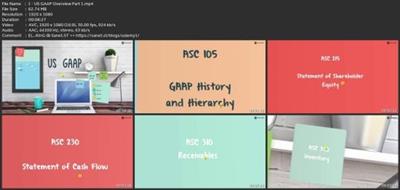
rapidgator.net:
Код:
https://rapidgator.net/file/defa41e876b84d38179c217e9165d5cf/uhedv.Mastering.Us.Gaap.A.Guide.To.Financial.Reporting.Standards.part1.rar.html
https://rapidgator.net/file/3d3e21321494deb62e906edd05c4f8df/uhedv.Mastering.Us.Gaap.A.Guide.To.Financial.Reporting.Standards.part2.rar.html
https://rapidgator.net/file/2b38fd9b1e4d3f33518d795c9259c629/uhedv.Mastering.Us.Gaap.A.Guide.To.Financial.Reporting.Standards.part3.rar.html
https://rapidgator.net/file/a6b82a144c84e5da6fbf2c6edf30527f/uhedv.Mastering.Us.Gaap.A.Guide.To.Financial.Reporting.Standards.part4.rar.html
nitroflare.com:
Код:
https://nitroflare.com/view/CE73DBB2A733618/uhedv.Mastering.Us.Gaap.A.Guide.To.Financial.Reporting.Standards.part1.rar
https://nitroflare.com/view/65D08D9A8368922/uhedv.Mastering.Us.Gaap.A.Guide.To.Financial.Reporting.Standards.part2.rar
https://nitroflare.com/view/BA73C6B558334A8/uhedv.Mastering.Us.Gaap.A.Guide.To.Financial.Reporting.Standards.part3.rar
https://nitroflare.com/view/F3824FD5A5EECEF/uhedv.Mastering.Us.Gaap.A.Guide.To.Financial.Reporting.Standards.part4.rar
|

|

|
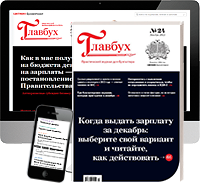    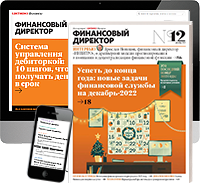  
Любые журналы Актион-МЦФЭР регулярно !!! Пишите https://www.nado.in/private.php?do=newpm&u=12191 или на электронный адрес pantera@nado.ws
|
Здесь присутствуют: 11 (пользователей: 0 , гостей: 11)
|
|
|
 Ваши права в разделе
Ваши права в разделе
|
Вы не можете создавать новые темы
Вы не можете отвечать в темах
Вы не можете прикреплять вложения
Вы не можете редактировать свои сообщения
HTML код Выкл.
|
|
|
Текущее время: 08:52. Часовой пояс GMT +1.
| |